If you’re looking for natural solutions to support your health, medicinal herbs offer a wide array of options with centuries of traditional use. From alleviating common ailments to promoting overall well-being, herbal remedies have been revered in traditional medicine across cultures. In this comprehensive guide, we will delve into the world of medicinal herbs and explore 101 types that are renowned for their healing properties.
With a rich history steeped in ancient wisdom, herbal medicine has stood the test of time. These natural remedies, derived from medicinal plants, harness the power of nature to support our body’s healing processes. From the vibrant purple petals of lavender to the humble green leaves of aloe vera, each herb offers unique compounds and health benefits that can enhance your well-being.
It’s important to note that while medicinal herbs are widely used and revered, it’s always recommended to consult with a healthcare professional before incorporating them into your health routine, especially if you’re currently taking medication or have specific health concerns.
Throughout this guide, we will explore the health benefits, traditional uses, and ways to incorporate these herbs into your daily life. Discover the power of nature’s healing herbs and unlock the potential of herbal remedies in supporting your overall health and wellness.
1. Aloe Vera
Aloe vera is a popular medicinal herb known for its soothing properties. The gel found inside the leaves of the aloe vera plant is rich in vitamins, minerals, and antioxidants, making it beneficial for a variety of health conditions. Its soothing and anti-inflammatory properties make it a common ingredient in skincare products, as it can help calm irritated skin and promote healing. Aloe vera can also be taken orally as a juice or supplement to support digestive health and boost the immune system. With its wide range of uses, aloe vera is a versatile herb that can be beneficial for overall well-being.
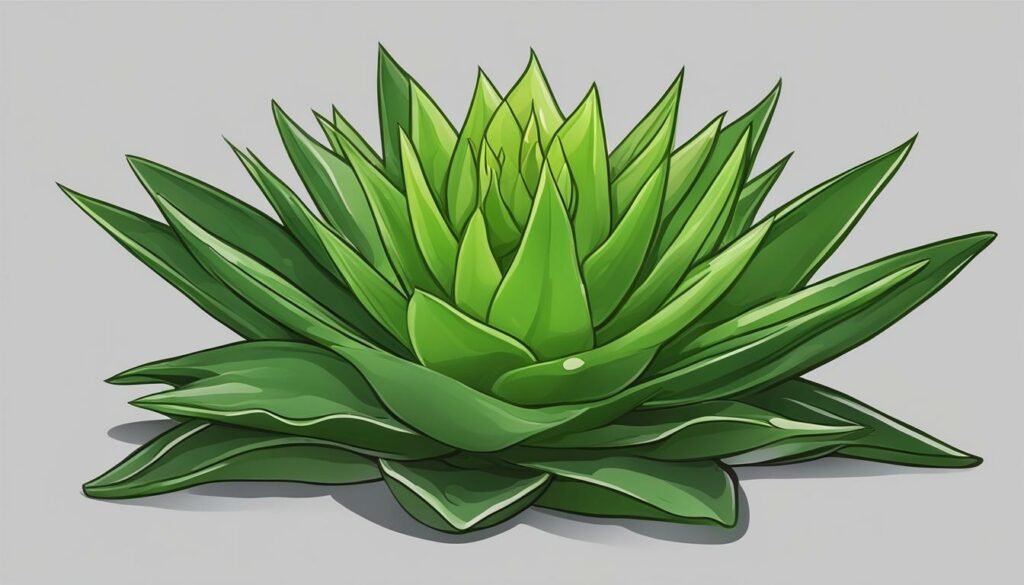
Aloe vera is a popular medicinal herb known for its soothing properties. The gel found inside the leaves of the aloe vera plant is rich in vitamins, minerals, and antioxidants, making it beneficial for a variety of health conditions.
Aloe vera is widely recognized for its soothing and cooling effects on the skin. It can provide relief for sunburns, minor cuts, and insect bites. The gel has natural anti-inflammatory properties that help reduce redness and swelling, promoting faster healing.
In addition to its topical applications, aloe vera gel can be ingested to support digestive health. It can alleviate symptoms of digestive disorders, such as acid reflux and irritable bowel syndrome (IBS). The gel’s natural enzymes aid in breaking down food and improving nutrient absorption, while its soothing properties can reduce inflammation in the digestive tract.
Aloe vera is also rich in antioxidants, which protect the body from oxidative stress and free radicals. These antioxidants help boost the immune system, making it more effective at fighting off infections and diseases.
Whether applied topically or consumed internally, aloe vera is a versatile herb that offers numerous benefits for skin health, digestive health, and overall well-being.
2. Peppermint
Peppermint is a refreshing herb that is widely known for its cooling and calming properties. It has been used for centuries as a natural remedy for digestive issues, such as indigestion, bloating, and gas. Peppermint tea, made from the leaves of the peppermint plant, is a popular beverage for soothing an upset stomach and promoting healthy digestion.
The key compound in peppermint is menthol, which provides a cooling sensation and can help relieve headaches and reduce muscle tension. This makes peppermint a go-to herb for natural headache relief and relaxation. In addition to its digestive benefits, peppermint has also been used for its antibacterial properties and is often consumed or used as an essential oil for fresh breath and oral health.

“Peppermint is a versatile herb that offers a wide range of benefits for digestive health, headaches, muscle tension, and oral health.”
Whether enjoyed as a hot or iced tea, added to recipes, or used topically, peppermint is a versatile herb with a myriad of uses. Its soothing properties and refreshing taste make it a popular choice for natural remedies and a pleasant addition to your wellness routine.
3. Echinacea
Echinacea is a popular herb known for its immune-boosting properties. It has been used for centuries in traditional medicine to support the immune system and combat colds, flu, and other respiratory infections. Echinacea is believed to stimulate the production of immune cells and enhance the body’s natural defense mechanisms. It is available in various forms, including teas, tinctures, and supplements, and is often used as a natural remedy for promoting respiratory health and overall well-being.

When it comes to maintaining a healthy immune system, echinacea has gained recognition as a powerful herbal supplement. The active compounds present in echinacea are believed to enhance the immune response, making it an effective natural remedy for fighting off colds, flu, and other respiratory infections.
Echinacea is rich in antioxidants that can help reduce inflammation and protect the body against oxidative stress. These properties contribute to respiratory health and overall well-being.
Whether you prefer to consume echinacea in the form of tea, tincture, or supplement, incorporating this herbal remedy into your daily routine can provide potential benefits for your immune system and respiratory health.
4. Chamomile
Chamomile is a gentle and soothing herb with a wide range of benefits. It is commonly consumed as a tea and is known for its calming properties, making it a popular choice for relaxation and promoting sleep. Chamomile tea is often used as a natural remedy for anxiety and stress relief. It is also beneficial for digestive health, as it can soothe an upset stomach and relieve indigestion. In addition, chamomile has anti-inflammatory properties and can be used topically to soothe irritated skin, such as eczema or sunburn.
Overall, chamomile is a versatile herb that can promote both physical and mental well-being.

5. Lavender
Lavender is a fragrant herb known for its calming and relaxing properties. It has been used for centuries to promote relaxation, reduce stress, and improve sleep quality. Lavender essential oil is often used in aromatherapy to create a calming environment and alleviate anxiety. In addition to its soothing effects on the mind, lavender can also benefit the skin. It has antimicrobial properties and can help reduce inflammation, making it a popular ingredient in skincare products. Whether enjoyed as a tea, used as an essential oil, or applied topically, lavender is a versatile herb that offers numerous health benefits.

6. Ginger
Ginger is a spicy and aromatic herb that has been used for centuries for its medicinal properties. It is well-known for its numerous benefits, particularly for digestive health and alleviating nausea. Whether you experience occasional indigestion or suffer from chronic digestive issues, ginger can offer relief. Its natural compounds help soothe the digestive tract, reduce inflammation, and alleviate symptoms such as bloating, gas, and stomach discomfort.
But ginger’s benefits go beyond digestive health. It also possesses powerful anti-inflammatory properties that can aid in reducing inflammation throughout the body. Chronic inflammation has been linked to various health issues, including heart disease, diabetes, and autoimmune disorders. By incorporating ginger into your diet or consuming it as a natural remedy, you can support your body’s defense against inflammation.
In addition to its anti-inflammatory effects, ginger is known to support and boost the immune system. Its immune-modulating properties help strengthen your body’s natural defenses and promote overall well-being. By enhancing immune function, ginger can help protect against various infections and illnesses.
One of the most popular ways to enjoy ginger’s benefits is by consuming it as ginger tea. Ginger tea is not only soothing and comforting, but it also allows you to experience the full goodness of ginger. Simply steep freshly grated or sliced ginger root in hot water for a few minutes, strain, and enjoy. You can also add a squeeze of lemon or a drizzle of honey for added flavor.

7. Turmeric
Turmeric is a vibrant yellow herb that contains the active compound curcumin, which has powerful anti-inflammatory and antioxidant properties. It has been used in traditional medicine to support joint health and alleviate pain and inflammation. Turmeric is also believed to support the immune system and promote overall well-being. It can be consumed as a spice in cooking or taken as a supplement to experience its health benefits. With its rich color and potent properties, turmeric is a valuable herb for promoting a healthy and active lifestyle.

8. Garlic
Garlic is a pungent and flavorful herb that offers numerous health benefits. It has long been known for its immune-boosting properties and can help support a healthy immune system. Garlic is also believed to have heart-healthy properties and can promote cardiovascular health by reducing cholesterol levels and improving blood circulation. It has anti-inflammatory and antibacterial properties as well, making it a popular choice for natural remedies and culinary use. From adding flavor to dishes to providing a natural defense against various health issues, garlic is a versatile herb with a range of benefits.

“Garlic has been used for centuries for its medicinal properties. Its immune-boosting effects can help your body fight off illnesses, and its heart-healthy properties support cardiovascular well-being. The anti-inflammatory and antibacterial properties of garlic make it a valuable natural remedy for a wide range of health conditions.”
Here are some key benefits of garlic:
- Boosts the immune system: Garlic can strengthen your immune system, helping your body fight against viruses and bacteria.
- Supports heart health: Garlic can lower cholesterol levels, reduce blood pressure, and improve blood circulation, promoting cardiovascular well-being.
- Has anti-inflammatory properties: Garlic can help reduce inflammation in the body, potentially alleviating symptoms of inflammatory conditions.
- Has antibacterial properties: Garlic’s natural antibacterial properties can help combat various infections, preventing the growth of harmful bacteria.
- Acts as a natural remedy: Garlic has been used as a natural remedy for different ailments throughout history, offering relief for various health issues.
- A versatile culinary herb: Garlic not only brings flavor to dishes but also provides a range of health benefits, making it a staple in many cuisines.
| Benefit | Description |
|---|---|
| Boosts the immune system | Garlic strengthens the immune system, helping to fight off illnesses caused by viruses and bacteria. |
| Supports heart health | Garlic can lower cholesterol levels, reduce blood pressure, and improve blood circulation, supporting cardiovascular health. |
| Has anti-inflammatory properties | Garlic has natural anti-inflammatory properties, which may help reduce inflammation in the body and alleviate symptoms of inflammatory conditions. |
| Has antibacterial properties | Garlic’s antibacterial properties can help combat various infections and inhibit the growth of harmful bacteria. |
| Acts as a natural remedy | Garlic has a long history of use as a natural remedy, offering relief for a wide range of health issues. |
| A versatile culinary herb | In addition to its health benefits, garlic adds flavor to a variety of dishes, making it a staple in many cuisines around the world. |
9. Calendula
Calendula, also known as marigold, is a vibrant and healing herb that offers numerous benefits for the skin. It is commonly used in topical remedies and skin care products for its anti-inflammatory and wound-healing properties. Calendula can help soothe irritated skin, reduce redness and inflammation, and promote the healing of wounds and minor cuts.
One of the key benefits of calendula is its ability to support skin health. It has been used for centuries as a natural remedy for various skin conditions, including eczema, acne, and dermatitis. Calendula’s anti-inflammatory properties can help calm irritated skin, while its wound-healing properties promote the regeneration of healthy skin cells.
Calendula is often used in the form of creams, ointments, or infused oils for topical application. Its gentle nature makes it suitable for all skin types, including sensitive skin. Whether you’re dealing with dryness, redness, or minor skin injuries, incorporating calendula into your skincare routine can provide soothing relief and promote overall skin health.

Calendula oil is a popular way to harness the benefits of this herb. The oil can be applied directly to the skin or used as a base for homemade salves and balms. Calendula-infused oil is known for its nourishing and protective properties, making it a valuable addition to your natural skincare arsenal.
Did You Know? Calendula has been used since ancient times for its medicinal properties. In traditional medicine, it was often used to treat wounds, inflammation, and skin infections.
As a natural remedy, calendula offers a gentle and effective solution for skin issues. Its anti-inflammatory and wound-healing properties make it a versatile herb for promoting skin health and supporting the body’s natural healing processes.
| Benefits of Calendula |
|---|
| Anti-inflammatory |
| Wound healing |
| Soothes irritated skin |
| Promotes skin regeneration |
| Supports overall skin health |
10. Rosemary
Rosemary is an aromatic herb that is well-known for its culinary uses, but it also offers numerous health benefits. It has been traditionally used to support cognitive function and memory, making it a popular choice for students or those looking to improve focus and concentration. Rosemary is rich in antioxidants and has anti-inflammatory properties, which can help protect the body against oxidative stress and inflammation. It can be consumed as a seasoning in cooking, brewed into tea, or used in essential oil form for various purposes. From enhancing flavor to boosting overall well-being, rosemary is a versatile herb that can be enjoyed in many ways.
11. Thyme
Thyme is a fragrant herb that is commonly used as a seasoning in cooking, but it also offers several health benefits. It has long been used as a natural remedy for respiratory issues, such as coughs, congestion, and bronchitis. Thyme has antimicrobial properties and can help fight against bacteria, viruses, and fungi. It is also believed to support the immune system and promote overall well-being. Thyme can be brewed into a tea, used in cooking, or taken as a supplement for its therapeutic effects. With its distinct flavor and healing properties, thyme is a valuable herb for respiratory health and beyond.

12. Sage
Sage is a versatile herb that offers numerous health benefits. It has been traditionally used to support cognitive function and memory, making it a popular choice for students or those experiencing age-related cognitive decline. Sage is also believed to alleviate menopausal symptoms, such as hot flashes and night sweats. Additionally, sage has antimicrobial properties and can help fight against bacteria and viruses. It is commonly used as a culinary herb to enhance the flavor of dishes, but it can also be brewed into tea or used as a natural remedy for digestive issues. Sage is a valuable herb with a wide range of uses and benefits.

13. Cinnamon
Cinnamon is a warm and fragrant spice that offers numerous health benefits. It is well-known for its ability to help regulate blood sugar levels and improve insulin sensitivity, making it a valuable herb for those with diabetes or pre-diabetes. Cinnamon is also rich in antioxidants and has anti-inflammatory properties, which can help protect against oxidative stress and inflammation in the body.
Cinnamon is a versatile culinary spice that can be used in both sweet and savory dishes to add a unique flavor and aroma. From cinnamon rolls to curries, this spice enhances the taste of various cuisines. Additionally, cinnamon can be brewed into a comforting tea or taken as a supplement to experience its health benefits.
One of the key benefits of cinnamon is its ability to support blood sugar control. Research has shown that cinnamon can lower fasting blood sugar levels and improve insulin sensitivity in individuals with diabetes. It may also help reduce the risk of developing type 2 diabetes by lowering blood sugar levels and improving overall glycemic control.

Cinnamon is also packed with antioxidants, which help protect the body against free radicals and oxidative stress. These antioxidants can help reduce inflammation and may have anti-aging effects. Cinnamon’s anti-inflammatory properties can also benefit individuals with inflammatory conditions, such as arthritis.
In addition to its blood sugar control and antioxidant properties, cinnamon has been used as a natural remedy for various ailments. It is believed to have antimicrobial and antifungal properties, which can help combat infections. Furthermore, cinnamon has been linked to improved cognitive function and may aid in brain health.
Incorporating cinnamon into your daily diet is easy. Sprinkle it on oatmeal or yogurt, add it to coffee or tea, or use it to spice up your favorite recipes. Cinnamon tea is a popular way to enjoy its warm and comforting flavor while reaping its health benefits. Whether you use it as a culinary spice or a natural remedy, cinnamon is a versatile herb that brings both flavor and wellness to your life.
14. Fennel
Fennel is a flavorful and aromatic herb that offers several health benefits, particularly for digestive health. It has been used for centuries to alleviate digestive issues, such as bloating, indigestion, and colic. Fennel can help relax the muscles of the digestive tract and reduce bloating and discomfort. It is often consumed as a tea or used as a seasoning in cooking. Fennel is a gentle herb that is suitable for all ages and can be a valuable addition to a natural remedy toolkit for digestive issues.
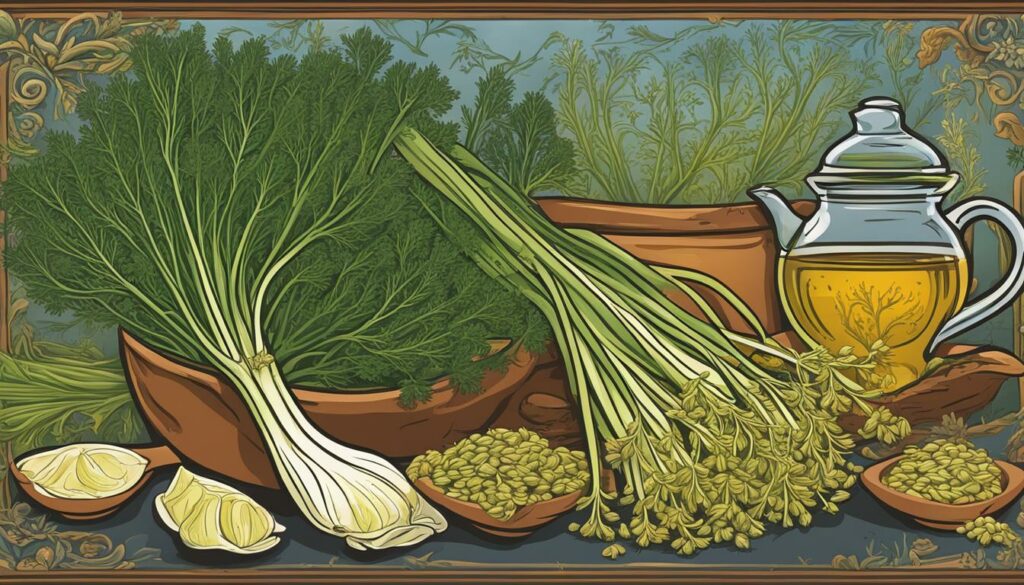
15. Basil
| Basil Benefits | Culinary Herb | Antioxidant | Anti-inflammatory | Digestive Health | Natural Remedy | Basil Essential Oil |
|---|---|---|---|---|---|---|
|
|
|
|
|
|
|

Basil is a popular culinary herb used in cuisines around the world. Not only does it enhance the taste of a variety of dishes, but it also offers several health benefits. Basil is rich in antioxidants, which protect the body from harmful free radicals. It also has anti-inflammatory properties that reduce inflammation in the body, promoting overall wellness. Additionally, basil supports digestive health and can help alleviate indigestion, gas, and bloating.
Aside from being a culinary herb, basil is also used as a natural remedy in the form of teas, tinctures, and essential oils. Its therapeutic effects make it a versatile herb for various ailments. Basil essential oil, in particular, is highly valued for its potent properties.
Whether enjoyed in a pasta dish, brewed into a tea, or used in its essential oil form, basil is an herb that not only adds flavor to your meals but also offers a range of health benefits.
16. Oregano
Oregano is a fragrant herb that is commonly used in Mediterranean cuisine. Its distinct flavor adds depth and aroma to various dishes. Beyond its culinary appeal, oregano also offers several health benefits.
One of the key benefits of oregano is its antimicrobial properties. It contains compounds that possess potent antimicrobial activity, making it effective in fighting against bacteria, viruses, and fungi. Incorporating oregano into your diet can help support your immune system and promote overall well-being.
Oregano is particularly beneficial for respiratory health. It can help relieve symptoms associated with respiratory conditions such as coughs, colds, and flu. The natural compounds in oregano can help soothe the respiratory system and support its proper functioning.
“Oregano is a valuable herb with a distinct flavor and numerous health benefits.”
In addition to its antimicrobial and respiratory benefits, oregano is also a rich source of antioxidants. These compounds help protect the body against oxidative stress and reduce inflammation, contributing to overall health and well-being.
Oregano can be enjoyed in various forms. It can be used as a seasoning in cooking to enhance the flavor of dishes. Brewing oregano into a tea is another way to harness its benefits. Oregano essential oil is also available and can be used topically or ingested for its therapeutic effects.
With its versatility in the kitchen and its potential health benefits, oregano is not just a staple culinary herb but also a natural remedy worth incorporating into your lifestyle.
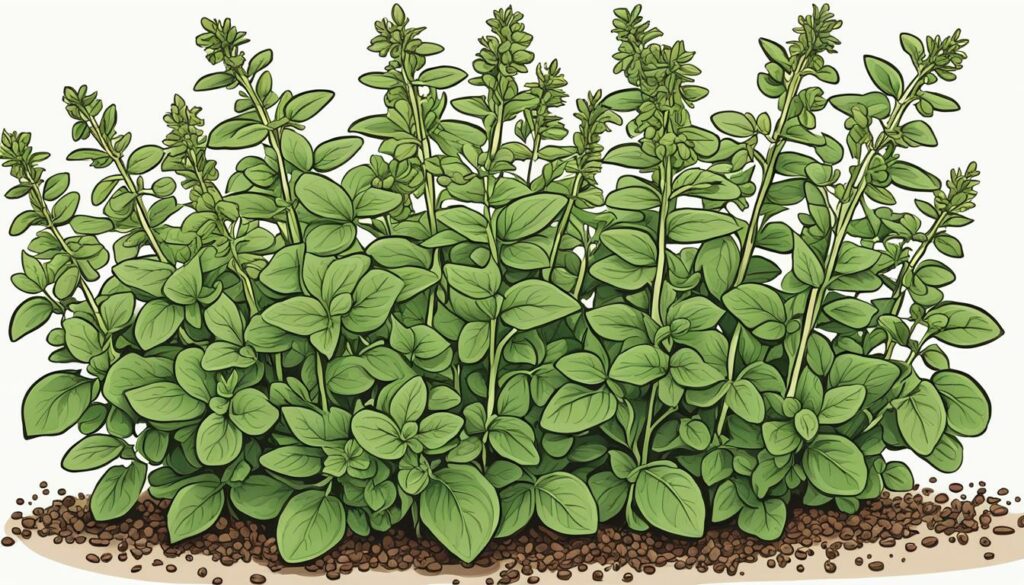
17. Dandelion

Dandelion is a common weed that offers several health benefits, particularly for detoxification and liver health. It contains diuretic properties that help support kidney function and promote the elimination of toxins from the body. In addition, dandelion is believed to support digestive health by alleviating bloating and indigestion. This versatile herb can be consumed in various forms such as dandelion tea, used in salads, or taken as a supplement to experience its therapeutic effects.
18. Lemon Balm
Lemon balm is a calming and aromatic herb that offers several health benefits. It is well-known for its ability to promote relaxation and reduce stress and anxiety. Lemon balm can also help improve sleep quality and promote a sense of calmness. Additionally, it has been used to support digestive health and alleviate symptoms of indigestion and bloating.
Lemon balm is commonly consumed as a tea or used as a natural remedy for its therapeutic effects. With its fresh and citrusy flavor, lemon balm is a versatile herb that can provide a range of health benefits.
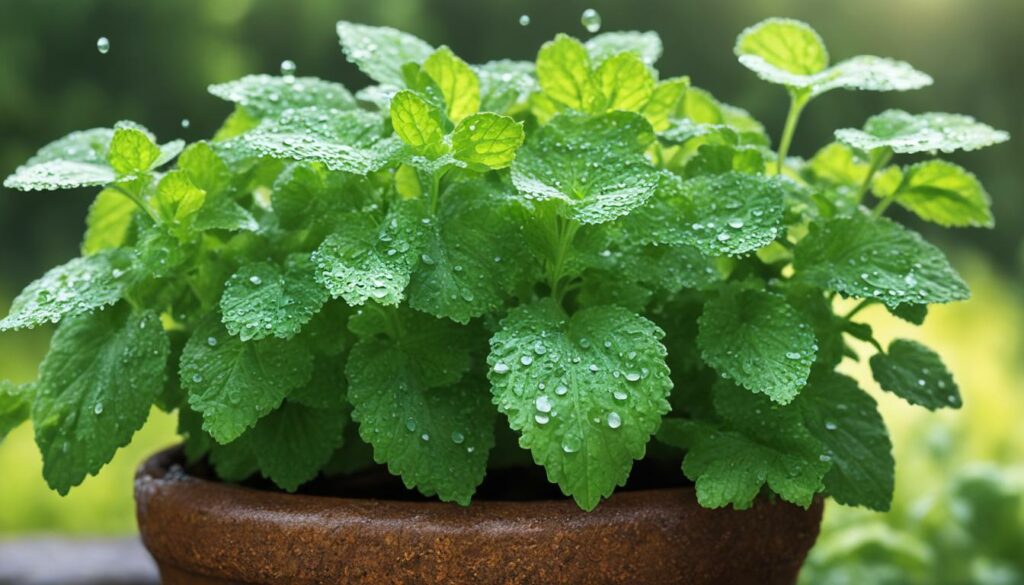
19. Catnip
Catnip is an herb that is well-known for its effects on cats, but it also offers several health benefits for humans. It has calming properties and can help reduce stress, promote relaxation, and improve sleep quality. Catnip can also support digestive health and alleviate symptoms of indigestion and bloating.
One popular way to enjoy the benefits of catnip is to consume it as catnip tea. Catnip tea is made by steeping dried catnip leaves in hot water. It has a soothing aroma and a mild, pleasant taste. Drinking catnip tea before bedtime can help relax the mind and body, making it an excellent sleep aid.
In addition to its relaxation and sleep-inducing properties, catnip is also believed to have digestive health benefits. It can help relieve symptoms of indigestion, such as bloating and gas, and promote a healthy digestive system.
Catnip is often used as a natural remedy for various ailments due to its gentle nature and lack of side effects. It can be consumed as a tea, used in herbal preparations, or taken in supplement form. However, it is important to note that catnip may not be suitable for everyone, and it is always recommended to consult with a healthcare professional before using any herbal remedies.

Overall, catnip is a versatile herb that offers relaxation, stress relief, sleep aid, and digestive health benefits. Whether enjoyed as a calming tea or used in herbal preparations, catnip can be a valuable addition to your natural remedy toolkit.
20. Valerian
Valerian is a powerful herb that offers a natural remedy for relaxation and sleep aid. For centuries, it has been used to promote calmness, relieve anxiety, and improve the quality of sleep. Valerian works by interacting with the neurotransmitter GABA, which helps regulate mood and promotes relaxation, making it an ideal choice for stress reduction and anxiety relief.
Valerian can be consumed as a tea or taken in supplement form to experience its therapeutic effects. It is commonly used as a sleep aid, helping individuals fall asleep faster and improve sleep quality. By relaxing the body and mind, Valerian can provide a natural solution to those struggling with sleep issues or looking for a way to unwind after a long day.
Valerian is a valuable herb for individuals seeking a natural alternative to pharmaceutical sleep aids and anxiety medications. With its soothing properties and ability to promote relaxation, Valerian offers a gentle and effective approach to achieving a calm state of mind and a restful night’s sleep.
To experience the benefits of Valerian, you can brew a cup of Valerian tea using dried Valerian root. Simply steep the herb in hot water for a few minutes and enjoy a calming and relaxing cup of tea before bedtime. Alternatively, Valerian supplements are available in various forms, such as capsules or tinctures, for convenient and easy consumption. However, it is recommended to consult with a healthcare professional before starting any new herbal regimen.
“Valerian is a powerful herb that offers a natural remedy for relaxation and sleep aid.”
| Benefits of Valerian | Usage |
|---|---|
| Promotes relaxation and calmness | Consumed as a tea or supplement |
| Relieves anxiety and stress | Provides natural sleep aid |
| Improves sleep quality | Interacts with GABA neurotransmitter |

21. St. John’s Wort
St. John’s Wort is a medicinal herb that is well-known for its mood-supporting properties. It has been used for centuries to alleviate symptoms of depression, anxiety, and seasonal affective disorder. St. John’s Wort contains active compounds, such as hypericin and hyperforin, which are believed to affect neurotransmitters in the brain and promote a positive mood. It is commonly taken in the form of capsules or tinctures for its therapeutic effects. However, it is important to note that St. John’s Wort can interact with certain medications, so it is recommended to consult with a healthcare professional before use. St. John’s Wort is a valuable herb for those seeking natural support for their mental well-being.
22. Licorice Root
Licorice root is a traditional herb that offers several health benefits, particularly for digestive health and adrenal support. It has been used for centuries to alleviate symptoms of indigestion, heartburn, and acid reflux. Licorice root can help soothe the digestive tract and reduce inflammation in the stomach and intestines. It is also believed to support adrenal function and promote hormonal balance.
Licorice root can be consumed as a tea, taken in supplement form, or used topically for its therapeutic effects. However, it should be used in moderation and avoided by those with high blood pressure or certain medical conditions.
One popular way to enjoy the benefits of licorice root is by drinking licorice tea. Licorice tea is known for its mild and naturally sweet flavor, making it a pleasant and soothing beverage to enjoy. It can be consumed hot or cold, depending on personal preference.
Aside from its digestive and adrenal support, licorice root is also considered a natural remedy for sore throat and cough relief. Its soothing properties can help alleviate throat irritation and promote healing.
Licorice root is available as a herbal supplement in various forms such as capsules, powders, and liquid extracts. Before incorporating licorice root into your routine, it is recommended to consult with a healthcare professional to ensure it is safe and appropriate for your individual needs.
23. Nettle
Nettle, also known as stinging nettle (Urtica dioica), is a perennial flowering plant that is native to Europe, Asia, and North America. It has been used medicinally for centuries for its various health benefits. Nettle is rich in vitamins, minerals, and antioxidants, making it a popular choice in herbal medicine. Some of the potential benefits of nettle include reducing inflammation, relieving allergies, improving prostate health, supporting urinary tract health, and promoting healthy hair. Nettle can be consumed as a tea or taken in supplement form. It’s important to use caution when handling fresh nettle leaves, as they can cause skin irritation due to their stinging hairs.

Nettle, also known as stinging nettle (Urtica dioica), is a perennial flowering plant that is native to Europe, Asia, and North America. It has been used medicinally for centuries for its various health benefits. Nettle is rich in vitamins, minerals, and antioxidants, making it a popular choice in herbal medicine. Some of the potential benefits of nettle include reducing inflammation, relieving allergies, improving prostate health, supporting urinary tract health, and promoting healthy hair. Nettle can be consumed as a tea or taken in supplement form. It’s important to use caution when handling fresh nettle leaves, as they can cause skin irritation due to their stinging hairs.
24. Yarrow
Yarrow (Achillea millefolium) is a flowering plant that is native to Europe and North America. It has been utilized for centuries in traditional medicine due to its numerous health benefits. Yarrow is known for its anti-inflammatory, antimicrobial, and analgesic effects, making it a valuable herb in promoting overall well-being.
One of the primary uses of yarrow is in the treatment of wounds. It has been used topically as a poultice to help stop bleeding, speed up the healing process, and prevent infection. Yarrow is also beneficial for digestive issues, such as indigestion and bloating, as it can help soothe the stomach and promote healthy digestion.
Yarrow is commonly consumed as a tea, which offers several health benefits. Yarrow tea has been traditionally used to relieve menstrual problems, including cramps and irregular periods. It is also believed to have respiratory benefits, helping to alleviate symptoms of coughs, colds, and congestion.
In addition to its herbal uses, yarrow is available in the form of essential oil. Yarrow essential oil can be used topically, diluted with a carrier oil, to help reduce inflammation and soothe skin irritations. It is important to note that essential oils should always be used with caution and properly diluted before use.

When considering the use of yarrow or any herbal remedy, it is crucial to consult with a healthcare professional. They can provide guidance on the appropriate dosage, potential interactions with medications, and any precautions to be aware of. Yarrow is a versatile plant with many potential health benefits, but it is always best to use it under the supervision of a knowledgeable healthcare provider.
25. Holy Basil (Tulsi)
Holy basil, also known as Tulsi (Ocimum tenuiflorum), is a sacred herb in Ayurvedic medicine and is native to the Indian subcontinent. With its rich history of use spanning thousands of years, holy basil is revered for its numerous health benefits.
As an adaptogen, holy basil helps your body adapt to stress and promotes overall well-being. Its anti-inflammatory and antioxidant properties make it a powerful natural remedy. Whether consumed as a tea or taken in the form of an extract, holy basil offers a range of health benefits.
Some of the notable health benefits of holy basil include:
- Reducing stress levels and promoting relaxation
- Improving respiratory health
- Supporting cardiovascular health
- Enhancing cognitive function
Throughout history, holy basil has been used for its immune-boosting effects. It helps strengthen the body’s defenses and increases its resistance to infections. Furthermore, its anti-inflammatory properties contribute to overall wellness.

When consumed as a tea, holy basil delivers its health benefits while also providing a soothing and refreshing experience. Holy basil extract, on the other hand, offers a concentrated and convenient way to benefit from its medicinal properties. However, it’s important to note that holy basil may interact with certain medications, so it’s always advisable to consult with a healthcare professional before using it.
Experience the power of holy basil and embrace its holistic approach to well-being.
26. Ashwagandha
Ashwagandha (Withania somnifera), also known as Indian ginseng or Indian winter cherry, is a versatile herb that has been used in Ayurvedic medicine for thousands of years. It is native to Africa and Asia and grows in some parts of the Middle East and India. Ashwagandha is known for its adaptogenic properties, meaning it can help the body cope with stress. It has been traditionally used to boost energy levels, reduce anxiety and stress, and alleviate pain and inflammation. Ashwagandha has also been used to improve male sexual health by boosting testosterone levels and supporting erectile function. It is available in various forms, including capsules, tinctures, and powders. It’s essential to use ashwagandha with caution, as it may interact with certain medications and should be avoided during pregnancy.
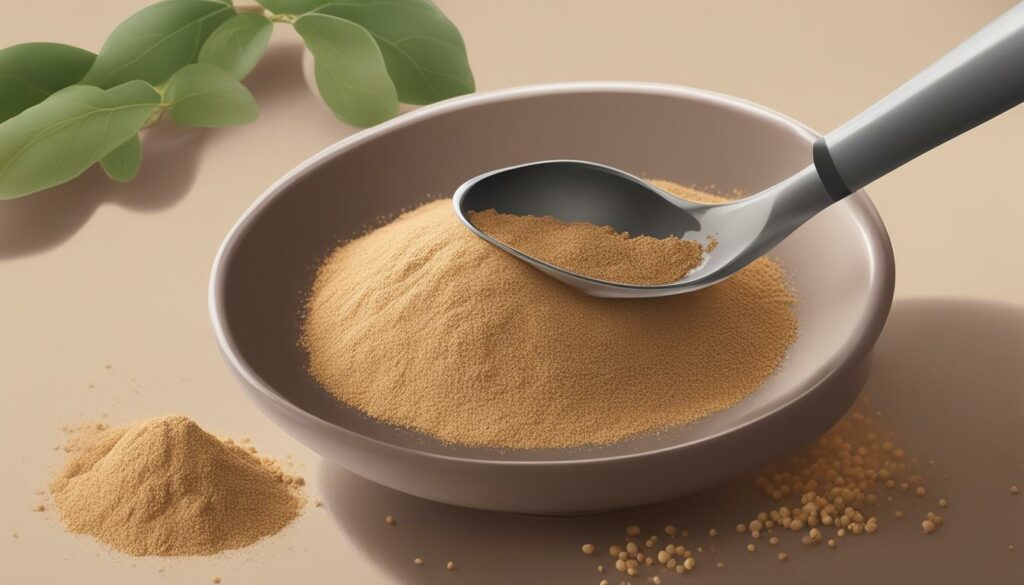
27. Milk Thistle

Milk thistle (Silybum marianum) is a flowering plant that is native to the Mediterranean region but is now grown worldwide. It has been used as a herbal remedy for liver disorders for thousands of years. Milk thistle contains a bioactive compound called silymarin, which is believed to have antioxidant and anti-inflammatory properties. Silymarin is known to support liver health by protecting liver cells from damage and promoting their regeneration. Milk thistle is commonly used to support liver detoxification, improve digestion, and promote overall liver health. It is available as a supplement in the form of capsules, tablets, or liquid extracts. It’s important to note that milk thistle may interact with certain medications, and it’s best to consult with a healthcare professional before using it.
28. Arnica
Arnica (Arnica montana) is a perennial flowering plant that is native to Europe and Siberia. It has been used for centuries in traditional medicine for its anti-inflammatory and analgesic properties. Arnica contains compounds called sesquiterpene lactones, which are believed to have anti-inflammatory effects.
Arnica is commonly used topically in the form of gels, creams, or ointments to relieve pain, reduce swelling, and promote the healing of bruises and sprains. Its natural properties make it a popular choice for those looking for alternative remedies for pain relief and recovery. However, arnica should not be ingested or applied to open wounds, as it may cause skin irritation or other adverse effects.
Arnica gel and arnica cream are widely available and can be used by applying a thin layer to the affected area. Remember to follow the directions on the packaging and consult with a healthcare professional if you have any underlying health conditions or concerns.
Arnica is an effective natural remedy that can be part of your wellness routine, helping you find relief from pain and inflammation. Incorporating arnica products into your self-care regimen can support your body’s healing process and promote overall well-being.
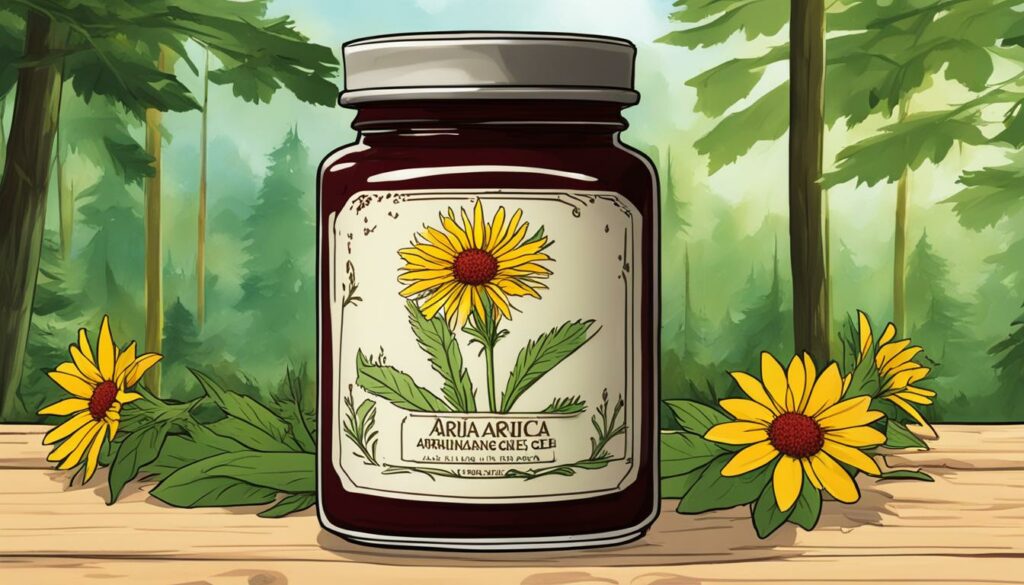
29. Black Cohosh
Black cohosh (Actaea racemosa) is a perennial herb that is native to North America. It has a long history of use in traditional Native American medicine and is commonly used today for its health benefits, particularly in women’s health. Black cohosh is known for its potential to alleviate symptoms of menopause, including hot flashes, mood swings, and sleep disturbances. It contains compounds called triterpene glycosides, which have hormonal effects in the body. Black cohosh is available in various forms, including capsules, tablets, and tinctures. However, it’s important to note that black cohosh may interact with certain medications and should only be used under the guidance of a healthcare professional.

30. Burdock
Burdock is a biennial plant native to Europe and Asia, but it now grows in various parts of the world. This plant has been used for centuries in traditional medicine for its potential health benefits. One of the primary benefits of burdock is its ability to support healthy skin. It contains anti-inflammatory and antioxidant properties that make it effective in treating skin conditions such as eczema, acne, and psoriasis.
In addition to its benefits for the skin, burdock also has diuretic and detoxifying effects. It supports healthy liver function and promotes overall well-being. Burdock can be consumed as a tea or taken in capsule form to enjoy its health benefits. It is also available in the form of creams and ointments for topical application.
When using burdock, it’s important to consult with a healthcare professional, especially if you have any underlying health conditions. They can provide guidance on the appropriate dosage and usage of burdock to ensure maximum benefits and safety.
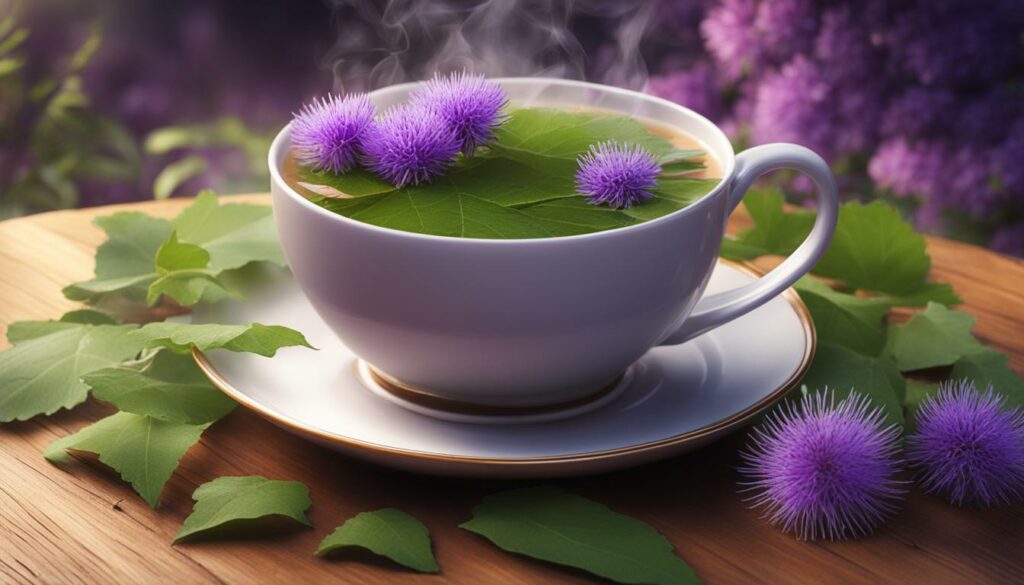
31. Cayenne
Cayenne (Capsicum annuum) is a hot chili pepper that is often used as a spice in various cuisines worldwide. It is also valued for its potential health benefits. Cayenne contains a compound called capsaicin, which gives it its spicy taste and is responsible for many of its potential health effects. Capsaicin has been found to have analgesic properties and can help relieve pain. It is commonly used topically in the form of creams or ointments to alleviate muscle and joint pain. Cayenne may also aid in digestion, support cardiovascular health, and have antimicrobial properties. It can be consumed as a spice or taken in supplement form. However, it’s important to use cayenne in moderation and avoid excessive consumption, as it can cause gastrointestinal irritation in some individuals.

32. Comfrey
Comfrey (Symphytum officinale) is a perennial herb that is native to Europe but now grows in various parts of the world. It has been used for centuries in traditional medicine for its potential healing properties. Comfrey contains compounds called allantoin, rosmarinic acid, and tannins, which are believed to have anti-inflammatory and wound-healing effects.
Comfrey preparations, such as creams or ointments, are commonly used topically to promote the healing of bruises, sprains, and other injuries. The application of comfrey cream or ointment can help soothe inflammation, reduce pain, and accelerate the healing process. Additionally, comfrey may also benefit skin conditions such as eczema and psoriasis.
However, it’s important to note that comfrey should only be used externally, as internal use or ingestion of comfrey can be toxic to the liver. It’s best to consult with a healthcare professional before using comfrey preparations to ensure its safe and appropriate use.

33. Goldenseal
Goldenseal (Hydrastis canadensis) is a perennial herb that is native to North America. It has a long history of use in Native American medicine and is now popularly used in herbal remedies. Goldenseal contains berberine, a compound with antimicrobial and anti-inflammatory properties. It is commonly used to support immune function and promote digestive health. Goldenseal may be used topically to aid in wound healing and relieve skin irritations. It is available in various forms, including capsules, tinctures, and teas. However, it’s important to note that goldenseal should be used with caution, as it may interact with certain medications and should be avoided during pregnancy.

| Health Benefits of Goldenseal |
|---|
| Supports immune function |
| Promotes digestive health |
| Aids in wound healing |
| Relieves skin irritations |
34. Hawthorn
Hawthorn, belonging to the genus Crataegus, is a shrub or small tree that is native to Europe, Asia, and North America. It has a long history of use in traditional medicine for its potential cardiovascular benefits. Hawthorn is rich in antioxidants and bioflavonoids, which have been found to support heart health by improving blood flow, reducing blood pressure, and protecting against oxidative stress.
Research suggests that hawthorn may help manage conditions such as high blood pressure, angina, and congestive heart failure. It is believed to strengthen the heart muscle, dilate blood vessels, and improve the overall efficiency of the cardiovascular system.
Hawthorn can be consumed as a tea, taken in supplement form, or used in culinary preparations. Its berries are commonly used for medicinal purposes and can be made into jams, jellies, or tinctures. Hawthorn products are also available in the form of capsules or tablets.
If you are considering using hawthorn for its potential health benefits, it’s important to consult with a healthcare professional, especially if you have any underlying heart conditions or are taking medications. They can provide guidance on the appropriate dosage and ensure that it does not interact with any of your current medications.

35. Elderberry
Elderberry, belonging to the Sambucus genus, is a flowering plant that is native to Europe, Asia, and North America. It has a long history of use in traditional medicine for its potential immune-boosting properties. Elderberries are rich in antioxidants, including anthocyanins, which have been found to support immune function and reduce the duration and severity of cold and flu symptoms. Elderberry preparations, such as syrups or extracts, are commonly used to support immune health and promote respiratory health. It’s important to note that raw elderberries should not be consumed as they can cause gastrointestinal upset. It’s best to use elderberry preparations under the guidance of a healthcare professional, especially if you have any underlying health conditions or are taking medications.

36. Passionflower
Passionflower (Passiflora incarnata) is a perennial vine that is native to the Americas. It has been used in traditional medicine for its potential calming and sleep-promoting effects. Passionflower contains compounds, including flavonoids and alkaloids, which are believed to have sedative and anxiolytic properties. It is commonly used to alleviate symptoms of anxiety, promote relaxation, and improve sleep quality. Passionflower is available in various forms, including teas, tinctures, and capsules. It’s important to use passionflower with caution, as it may interact with certain medications and should not be used in combination with other sedatives or central nervous system depressants.

Passionflower has been used for centuries due to its potential calming and sleep-promoting effects.
37. Plantain

Plantain, belonging to the Plantago genus, is a common flowering plant that is native to Europe, Asia, and North America. It has a long history of use in traditional medicine for its potential healing properties. Plantain leaves contain compounds, including allantoin and aucubin, which are believed to have anti-inflammatory and wound-healing effects.
“Plantain is highly regarded for its ability to soothe and heal various skin conditions.”
Plantain preparations, such as creams or salves, are commonly used topically to alleviate skin irritations, insect bites, and minor wounds. Its natural anti-inflammatory properties make it an effective remedy for soothing itching and reducing redness. Plantain leaves can also be consumed as a tea, providing internal health benefits. However, it’s important to note that some individuals may be allergic to plantain and could experience an allergic reaction. It’s best to perform a patch test before using plantain preparations topically.
| Benefits of Plantain | How to Use |
|---|---|
| 1. Soothes skin irritations Allantoin and aucubin in plantain leaves help reduce inflammation and promote healing. |
Apply plantain salve or cream directly to the affected area. |
| 2. Alleviates insect bites Plantain’s anti-inflammatory properties can provide relief from itchiness and pain caused by insect bites. |
Apply a plantain poultice or salve to the affected area. |
| 3. Promotes wound healing Plantain’s wound-healing effects can aid in the recovery of minor cuts and abrasions. |
Apply plantain salve or cream to the wound to protect and promote healing. |
| 4. Supports respiratory health Drinking plantain tea may provide relief from coughs, colds, and other respiratory conditions. |
Steep dried plantain leaves in hot water to make a soothing tea. |
| 5. Anti-inflammatory effects Plantain can help reduce inflammation associated with various conditions, such as arthritis and skin disorders. |
Use plantain salve or cream on inflamed areas of the skin or take plantain extract orally. |
Plantain’s versatility and numerous health benefits have made it a staple in natural remedies and traditional medicine. Whether used topically or consumed internally, plantain can aid in the healing and soothing of various conditions. However, it’s always important to consult with a healthcare professional before using plantain or any herbal remedy, especially if you have any underlying health conditions or are taking medications.
38. Red Clover
Red clover (Trifolium pratense) is a perennial herb that is native to Europe, Asia, and North Africa, but is now cultivated worldwide. It has been used for centuries in traditional medicine for its potential health benefits. Red clover is rich in isoflavones, including genistein and daidzein, which have estrogen-like effects in the body. It is commonly used to alleviate menopausal symptoms, such as hot flashes and night sweats, and support overall hormonal balance. Red clover can be consumed as a tea or taken in supplement form. It’s important to note that red clover may interact with certain medications, especially medications that affect hormone levels.

Red clover offers several health benefits, primarily due to its high content of isoflavones. These plant compounds have estrogen-like effects in the body, making red clover a popular choice for women experiencing menopausal symptoms. Here are some key health benefits of red clover:
- Menopausal symptom relief: Red clover has been found to help reduce hot flashes, night sweats, and other menopausal symptoms. Its estrogenic properties can help balance hormone levels and alleviate discomfort.
- Bone health support: Red clover is rich in calcium and other minerals that contribute to strong and healthy bones. It may help prevent osteoporosis and improve bone density, especially in postmenopausal women.
- Heart health: The isoflavones in red clover may have a positive impact on cardiovascular health. They can help lower LDL cholesterol levels, reduce inflammation, and support healthy blood pressure levels.
- Anti-inflammatory properties: Red clover contains compounds that have anti-inflammatory effects. This can be beneficial for individuals with inflammatory conditions such as arthritis and joint pain.
Red clover is commonly consumed as a tea, which can be brewed from dried red clover flowers and leaves. It can also be taken in supplement form, such as capsules or tinctures. If you’re considering using red clover for its health benefits, it’s important to consult with a healthcare professional, especially if you have any underlying health conditions or are taking medications that may interact with red clover. They can provide guidance on the appropriate dosage and usage.
39. Devil’s Claw
Devil’s claw, scientifically known as Harpagophytum procumbens, is a flowering plant that originates from southern Africa. This plant has been utilized for centuries in traditional medicine due to its potential anti-inflammatory and analgesic properties. Devil’s claw contains essential compounds, such as harpagosides, which have been proven to possess anti-inflammatory effects.
One of the most common uses of devil’s claw is in relieving symptoms associated with arthritis, such as joint pain and inflammation. This natural remedy is available in various forms, such as capsules, tablets, and extracts. It is essential to consult with a healthcare professional prior to using devil’s claw, especially if you have underlying health conditions or are taking medications.

40. Bilberry
Bilberry (Vaccinium myrtillus) is a small shrub that is native to Europe and North America. It is closely related to the blueberry and is known for its potential health benefits. Bilberries are rich in antioxidants, including anthocyanins, which have been found to support eye health, improve circulation, and protect against oxidative damage. Bilberry is commonly used to promote visual acuity, support cardiovascular health, and enhance cognitive function. It is available in various forms, including capsules, tablets, and extracts. It’s important to note that bilberry may interact with certain medications, especially blood thinners. It’s best to consult with a healthcare professional before using bilberry supplements.

Incorporating bilberry into your wellness routine can provide a range of potential health benefits. The antioxidants in bilberries help neutralize harmful free radicals, protecting your cells from damage. By supporting eye health, bilberry extract may help improve night vision, reduce eye fatigue, and alleviate symptoms of eye strain.
Bilberries also have vasoprotective properties, meaning they support healthy blood vessels and circulation. This can contribute to improved cardiovascular health, helping to maintain healthy blood pressure and reduce the risk of heart disease. Additionally, bilberry’s antioxidant and anti-inflammatory properties may help enhance cognitive function, including memory and concentration.
Whether you choose to take bilberry in supplement form or incorporate it into your diet, it’s important to consult with a healthcare professional, especially if you are currently taking any blood thinners or have any underlying health conditions.
41. Ginkgo Biloba

Ginkgo biloba is a tree native to China that has been used in traditional Chinese medicine for thousands of years. Its leaves are known for their potential cognitive-enhancing and antioxidant effects. Ginkgo biloba extract contains flavonoids and terpenoids, which are believed to have neuroprotective and vasodilatory properties. It is commonly used to support cognitive function, improve memory and concentration, and enhance blood circulation. Ginkgo biloba is available in various forms, including capsules, tablets, and extracts.
It’s important to use ginkgo biloba with caution, as it may interact with certain medications and may not be suitable for individuals with bleeding disorders or those undergoing surgery. It’s best to consult with a healthcare professional before using ginkgo biloba supplements.
42. Gotu Kola
Gotu kola, scientifically known as Centella asiatica, is a perennial plant that is native to Asia but is now grown in various parts of the world. It has been used for centuries in Ayurvedic and traditional Chinese medicine for its potential health benefits.
Gotu kola contains triterpenoids, which are compounds known for their anti-inflammatory and antioxidant effects. These properties make Gotu kola a popular choice for supporting cognitive function, improving circulation, and promoting skin health.
You can consume Gotu kola as a tea or take it in the form of supplements. Additionally, it can be applied topically as a cream or ointment to promote skin health. However, it is important to note that Gotu kola may interact with certain medications. If you have liver conditions or autoimmune diseases, it is advisable to consult with a healthcare professional before using Gotu kola supplements.
In summary, Gotu kola is a versatile herb that offers potential health benefits. Whether you choose to consume it as a tea, take it in supplement form, or apply it topically, Gotu kola may support cognitive function, improve circulation, and promote skin health.
43. Marshmallow
Health Benefits and Uses of Marshmallow
Marshmallow, also known as Althaea officinalis, is a herb that has been used for centuries for its medicinal properties. It offers a wide range of health benefits and can be utilized in various forms to promote well-being.
One of the notable uses of marshmallow is in soothing sore throats, coughs, and digestive issues. The root of the marshmallow plant contains demulcent properties, which help create a protective layer over irritated tissues, providing relief from irritation and inflammation in the throat and digestive tract.
Marshmallow can be consumed as a tea, offering a soothing and comforting effect on the throat and digestion. It can also be made into a syrup or extract to enhance its medicinal properties. Additionally, marshmallow can be used topically in the form of creams and ointments, providing relief for skin irritations and inflammations.
By incorporating marshmallow into your wellness routine, you can harness its multiple benefits, enjoying improved throat health, enhanced digestion, and soothing relief for various discomforts. Consider adding marshmallow to your herbal remedies and experience the natural healing power it has to offer.
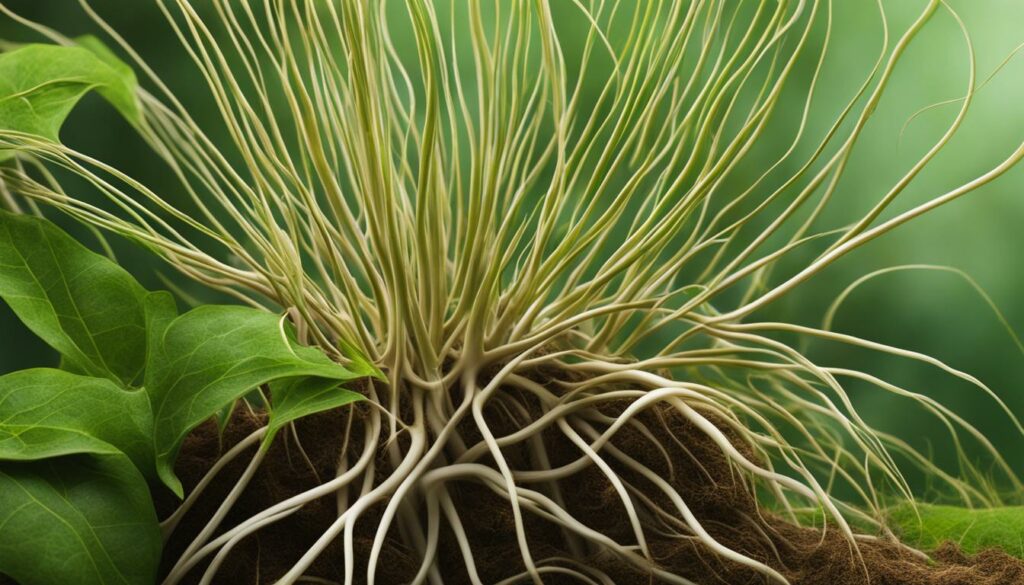
44. Mullein
Health Benefits and Uses of Mullein
Mullein, also known as Verbascum thapsus, is a plant that has a long history of medicinal use. It is commonly used to soothe respiratory conditions such as coughs, bronchitis, and asthma. Mullein is known for its expectorant and demulcent properties, which help to loosen and expel mucus from the respiratory tract.
The leaves and flowers of the mullein plant can be used to make a tea, which is often consumed for its respiratory benefits. Mullein tea can help relieve coughs and congestion by soothing the throat and reducing inflammation in the airways.
In addition to its respiratory benefits, mullein oil can be used topically to soothe skin irritations such as rashes, burns, and insect bites. It has anti-inflammatory and antimicrobial properties, making it an effective natural remedy for various skin conditions.

| Forms of Mullein | Benefits | Uses |
|---|---|---|
| Tea | – Relieves coughs and congestion – Soothes sore throat – Reduces inflammation in the airways |
– Brew mullein tea by steeping dried mullein leaves and flowers in hot water for 10-15 minutes – Strain and drink the tea daily |
| Oil | – Soothes skin irritations – Reduces inflammation – Provides antimicrobial effects |
– Apply mullein oil topically to affected areas of the skin – Gently massage until absorbed – Use as needed for relief |
Whether consumed as a tea or applied as oil, mullein offers natural relief for respiratory issues and skin irritations. Incorporating mullein into your wellness routine can provide soothing benefits and support overall respiratory and skin health.
45. White Willow Bark
White willow bark, also known as Salix alba, has been used for centuries as a natural remedy for pain and inflammation. It contains salicin, a compound that is similar to aspirin and has analgesic and anti-inflammatory properties. White willow bark is commonly used to relieve headaches, muscle and joint pain, and menstrual cramps. It can be consumed as a tea or taken in supplement form for its pain-relieving effects.
One of the key benefits of white willow bark is its natural pain-relieving properties. The salicin in white willow bark works by reducing the production of prostaglandins, which are chemicals responsible for promoting pain and inflammation in the body. By inhibiting prostaglandin synthesis, white willow bark can help alleviate pain without the side effects often associated with synthetic painkillers.
In addition to its pain-relieving effects, white willow bark also has natural anti-inflammatory properties. It can help reduce inflammation in the body, making it useful for conditions such as arthritis, tendonitis, and bursitis. By addressing the underlying inflammation, white willow bark provides relief and promotes healing.
White willow bark is often consumed as a tea. To make white willow bark tea, simply steep the bark in boiling water for about 10 minutes, then strain and drink. Some people also prefer to take white willow bark in supplement form, available as capsules or tablets.
It’s important to note that white willow bark may not be suitable for everyone. If you have a known allergy to aspirin or are taking blood-thinning medications, it’s best to avoid white willow bark. Additionally, pregnant and breastfeeding women should consult with their healthcare provider before using white willow bark.
Overall, white willow bark offers a natural and effective approach to pain relief and inflammation management. Whether enjoyed as a soothing tea or taken in supplement form, white willow bark can be a valuable addition to a natural pain management regimen.

46. Yucca
Health Benefits and Uses of Yucca
Yucca is a plant that is native to desert regions and has been used for centuries by Native Americans for its medicinal properties. It is commonly used to support joint health and reduce inflammation. Yucca contains saponins, which are natural compounds that have anti-inflammatory and antioxidant effects. Yucca can be taken in supplement form or used topically in creams and ointments for its anti-inflammatory benefits.

| Benefits of Yucca | Uses of Yucca |
|---|---|
| – Supports joint health | – Supplements |
| – Reduces inflammation | – Creams and ointments |
| – Contains anti-inflammatory compounds | |
| – Possesses antioxidant effects |
47. Devil’s Club
Devil’s Club, also known as Oplopanax horridus, is a plant that has been used for centuries in traditional medicine. It is native to the Pacific Northwest and is highly regarded for its immune-supportive properties. Devil’s Club is rich in antioxidants and has been used to boost the immune system and promote overall health and wellness. It can be consumed as a tea or taken in supplement form for its immune-supporting benefits.

“Devil’s Club is a powerful herbal remedy that has been used for generations to support the immune system. Its antioxidant-rich properties make it a valuable ally in promoting health and well-being.”
| Benefits of Devil’s Club | Uses of Devil’s Club |
|---|---|
| Boosts the immune system | Consumed as a tea |
| Promotes overall health and wellness | Taken in supplement form |
| Rich in antioxidants |
48. Boneset
Relief for Cold and Flu Symptoms
Boneset, scientifically known as Eupatorium perfoliatum, is a plant that has been trusted for centuries to provide relief from cold and flu symptoms. Its medicinal properties have made it a popular choice for those seeking relief from fever, congestion, and sweating associated with respiratory infections. Whether consumed as a tea or taken in supplement form, boneset offers a natural remedy for the discomfort caused by cold and flu viruses.
Supports the Immune System
In addition to its cold and flu relief abilities, boneset is also believed to have immune-supporting properties. By promoting sweating and helping to reduce fever, boneset aids the body’s natural defense mechanisms, supporting a strong immune system. Incorporating boneset into your wellness routine may help you maintain optimal immune function and overall well-being.

| Benefits of Boneset | Uses of Boneset |
|---|---|
|
|
49. Horsetail
Horsetail, also known as Equisetum arvense, is a plant that has been used for centuries for its medicinal properties. It is rich in minerals such as silica, which is important for healthy hair, nails, and bones. Horsetail is commonly used to promote hair growth, strengthen nails, and support urinary tract health. It can be consumed as a tea, taken in supplement form, or used topically in hair and nail products for its beneficial effects.

50. Shepherd’s Purse
Health Benefits and Uses of Shepherd’s Purse
Shepherd’s purse, also known as Capsella bursa-pastoris, is a plant that has a long history of traditional use for menstrual health. It is commonly used to reduce heavy menstrual bleeding and regulate the menstrual cycle. Shepherd’s purse contains compounds that help to constrict blood vessels, which can help to reduce excessive bleeding. It can be consumed as a tea or taken in supplement form for its menstrual health benefits.
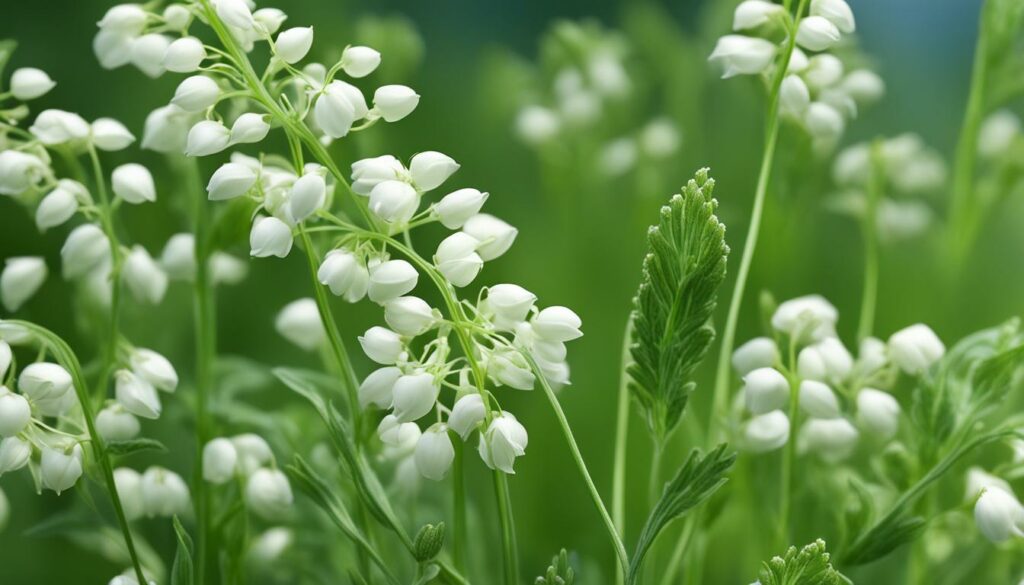
51. Wild Yam
Health Benefits and Uses of Wild Yam
Wild yam, also known as Dioscorea villosa, has a long history of use in traditional medicine for its hormonal balancing properties. It is commonly used to support hormonal balance, particularly in women going through menopause. Wild yam contains compounds that can be converted into progesterone, a hormone important for reproductive health.
Women experiencing hormonal imbalances, such as changes during menopause, may find wild yam beneficial for symptom management. It is believed to help alleviate hot flashes, night sweats, mood swings, and other common menopausal symptoms. By promoting hormonal balance, wild yam can help support overall well-being during this transitional phase of a woman’s life.
In addition to helping with menopause support, wild yam is also used for its potential anti-inflammatory properties. Some studies suggest that the plant may have mild anti-inflammatory effects, which can be beneficial for individuals dealing with conditions such as arthritis and digestive inflammation.
Wild yam is available in various forms, including capsules, creams, and ointments. It can be taken orally as a dietary supplement or applied topically to the skin for hormone-balancing effects. When using wild yam supplements or creams, it’s essential to follow the recommended dosage and consult with a healthcare professional if you have any concerns or underlying health conditions.
Incorporating wild yam into your healthcare routine can be a natural way to support hormonal balance and menopause symptoms. However, it’s crucial to keep in mind that individual experiences may vary, and it’s best to consult with a healthcare provider to determine the most suitable approach for your specific needs.

52. Witch Hazel
Health Benefits and Uses of Witch Hazel
Witch hazel, also known as Hamamelis virginiana, is a plant that offers several health benefits and is commonly used in skincare routines. Its astringent and soothing properties make it a popular ingredient in various skincare products.
One of the key benefits of witch hazel is its ability to tighten the skin. Applying witch hazel topically can help reduce the appearance of pores and improve skin texture, giving you a smoother complexion.
Additionally, witch hazel has anti-inflammatory properties, making it effective in reducing skin irritation and inflammation. It can be particularly beneficial for individuals with acne-prone or sensitive skin, as it helps calm redness and soothe itching.
Witch hazel is also known for its ability to provide relief from various skin conditions, such as eczema and psoriasis. Its soothing properties help alleviate itchiness and minimize discomfort.
To incorporate witch hazel into your skincare routine, you can use it as a toner, apply it topically in the form of a cream or ointment, or look for skincare products containing witch hazel as an active ingredient.
Overall, witch hazel is a versatile plant that offers multiple benefits for your skin. Its astringent properties help tighten and improve skin texture, while its anti-inflammatory and soothing effects make it an effective remedy for various skin conditions.

| Benefits | Uses |
|---|---|
| Tightens the skin | Reduce the appearance of pores |
| Reduces inflammation | Calms redness and soothes itching |
| Provides relief from skin conditions | Alleviates symptoms of eczema and psoriasis |
53. Black Walnut
Black walnut, also known as Juglans nigra, is a tree that has been revered for its medicinal properties for centuries. This powerful herb is commonly used to promote digestive health and cleanse the body of parasites. The numerous health benefits of black walnut are attributed to its rich content of antimicrobial and antiparasitic compounds.
Digestive health is essential for overall well-being. Black walnut has been traditionally used to soothe digestive discomfort, relieve symptoms of indigestion, and promote healthy digestion. It can help support the balance of gut flora and maintain a healthy gastrointestinal tract.
In addition to its digestive benefits, black walnut is widely recognized for its ability to cleanse the body of parasites. It contains natural compounds that have been shown to exert antimicrobial and antiparasitic effects. These properties make black walnut an effective remedy for various types of parasite infestations, including intestinal worms.
There are different ways to incorporate black walnut into your wellness routine. It can be consumed as a tincture or taken in supplement form to support digestive health and facilitate a parasite cleanse. The recommended dosage should be followed, and it’s always advisable to consult with a healthcare professional before starting any new herbal regimen.
When using black walnut, it’s recommended to prioritize high-quality products from reputable sources. This ensures that you are getting the full benefits of this remarkable herb while minimizing the risk of contamination or low potency.
To experience the potential health benefits of black walnut, consider adding it to your herbal arsenal. Whether you’re seeking digestive support or looking for a natural way to cleanse your body, black walnut may offer the wellness boost you’re looking for.
| Health Benefits of Black Walnut | Uses of Black Walnut |
|---|---|
|
|
Image:

Black walnut has long been valued for its digestive health benefits and its ability to cleanse the body of parasites. Incorporating this powerful herb into your routine may support overall wellness and help maintain a healthy digestive system.
54. Slippery Elm
Slippery elm, also known as Ulmus rubra, is a tree that has been used for centuries for its medicinal properties. It is commonly used to support digestive health and soothe sore throats. Slippery elm contains a mucilage substance that forms a protective layer over irritated tissues in the digestive tract, helping to relieve symptoms of conditions like acid reflux, gastritis, and inflammatory bowel disease. It can be consumed as a tea or taken in supplement form for its digestive and throat-soothing benefits.
If you’re looking to improve your digestive health, slippery elm can be a natural option to consider. Its mucilage content helps to soothe and protect the lining of the digestive tract, reducing inflammation and alleviating symptoms of various digestive disorders. Whether you’re dealing with acid reflux, gastritis, or inflammatory bowel disease, slippery elm can provide relief.
Additionally, slippery elm is known for its ability to soothe sore throats. The mucilage coats the throat, providing a protective barrier and reducing irritation. This can be particularly beneficial if you’re experiencing discomfort due to a cold, flu, or other respiratory infection. Slippery elm can be consumed as a tea or in lozenge form to provide relief for sore throats.

Incorporating slippery elm into your wellness routine can promote better digestive health and provide relief for sore throats. Whether you choose to enjoy it as a tea or include it in supplement form, slippery elm offers a natural remedy with centuries of traditional use to support your overall well-being.
55. Juniper
Juniper, also known as Juniperus communis, is a plant that has been used for centuries for its medicinal properties. It is commonly used to support urinary tract health and respiratory health. Juniper berries have diuretic properties, which can help to promote the elimination of toxins and support the health of the urinary system. Juniper can be consumed as a tea, taken in supplement form, or used topically in creams and ointments for its therapeutic effects.

Juniper berries are the fruit of the juniper plant and are often used in traditional herbal medicine. They contain various bioactive compounds, including essential oils and antioxidants, which contribute to their health benefits.
Key benefits of juniper:
- Promotes urinary tract health: Juniper berries have diuretic properties that can help flush out toxins from the urinary system, supporting its overall health.
- Supports respiratory health: Juniper has been used to treat respiratory conditions like coughs, bronchitis, and asthma, thanks to its expectorant and anti-inflammatory properties.
Juniper can be used in different forms to harness its beneficial effects. Here are some common uses:
| Form | Method of Use |
|---|---|
| Tea | Steep dried juniper berries in hot water for 10-15 minutes. Drink up to three cups a day. |
| Supplement | Take juniper berry extract or capsules as directed by the manufacturer. |
| Topical | Apply juniper-infused creams or ointments directly to the skin for respiratory or urinary tract support. |
It’s essential to consult with a healthcare professional before using juniper, especially if you have any underlying health conditions or are taking medications. Juniper may interact with certain medications, such as diuretics or lithium.
56. Angelica Root
Angelica root, also known as Angelica archangelica, is a plant with a rich history of use in traditional medicine. This powerful herb offers numerous health benefits, particularly in supporting digestive and menstrual health.

Health Benefits of Angelica Root
Angelica root possesses carminative properties that can effectively relieve digestive discomfort and improve digestion. It helps soothe the digestive system, alleviating issues such as bloating, gas, and indigestion.
Additionally, angelica root is believed to have emmenagogue properties, making it beneficial for menstrual health. It can help regulate menstrual cycles and relieve menstrual cramps, providing natural support for women’s reproductive health.
Uses of Angelica Root
Angelica root can be used in various forms to reap its health benefits. It can be consumed as a tea by steeping the dried root in hot water. The tea can be enjoyed alone or blended with other complementary herbs for enhanced effects.
For those seeking convenience, angelica root is also available in supplement form. These supplements provide concentrated doses of the herb’s active components, making it easier to incorporate into your daily routine.
It’s always advisable to consult with a healthcare professional before starting any new herbal regimen, especially if you are pregnant, breastfeeding, or have any underlying medical conditions.
With its digestive and menstrual health benefits, angelica root is a valuable addition to any natural wellness toolbox. Consider incorporating this powerful herb into your self-care routine to support overall well-being.
57. Eleuthero (Siberian Ginseng)
Eleuthero, also known as Siberian ginseng or Eleutherococcus senticosus, is a versatile adaptogenic herb with a wide range of health benefits. It has been used for centuries in traditional medicine for its ability to support the body’s natural response to stress and promote overall well-being.
One of the key benefits of eleuthero is its ability to enhance the body’s adaptability and resilience to stress. As an adaptogen, it helps the body adapt to physical, mental, and emotional stressors, improving stress resistance and reducing the negative effects of stress on the body.
In addition to its stress-relieving properties, eleuthero has other notable benefits. It supports immune function, helping to strengthen the body’s defense mechanisms and promote overall health. It also improves energy levels, reducing fatigue and enhancing physical and mental performance.
Eleuthero can be used in various forms, including capsules, tinctures, and teas. The dosage and duration of use may vary depending on the individual’s specific needs or health condition. As with any herbal supplement, it’s important to consult with a healthcare professional before starting any new herbal regimen.
Eleuthero is a natural and safe option for those looking to mitigate the negative effects of stress and promote overall well-being. Its adaptogenic properties, immune-boosting effects, and energy-enhancing qualities make it a valuable addition to a holistic approach to health and wellness.
Experience the benefits of eleuthero and unlock your body’s natural ability to adapt to stress, support your immune system, and enhance your overall well-being.
58. Eyebright
Health Benefits and Uses of Eyebright
Eyebright, also known as Euphrasia officinalis, is a plant that has been used for centuries for its medicinal properties. It offers a range of health benefits, particularly in promoting eye health and providing relief from allergies.
Eyebright contains compounds that have both anti-inflammatory and astringent properties. These properties make it highly effective in relieving various eye irritations, reducing redness, and minimizing inflammation.
When used topically as an eyewash, eyebright can effectively alleviate discomfort associated with eye strain, conjunctivitis, and allergic reactions. It helps to soothe and refresh tired and irritated eyes, providing much-needed relief.
In addition to its eye health benefits, eyebright can also play a valuable role in relieving allergy symptoms. Its anti-inflammatory properties help to ease the discomfort caused by allergic reactions, such as itching, redness, and swelling. Regular consumption or supplementation of eyebright can help diminish the allergic response and provide relief from common allergic symptoms.
Whether used as an eyewash or taken in supplement form, eyebright is a safe and natural remedy that supports overall eye health and can provide much-needed relief from eye irritations and allergy symptoms.

59. Gentian
Health Benefits and Uses of Gentian
Gentian, also known as Gentiana lutea, is a plant that has a long history of use in traditional medicine. It is commonly used to support digestive health and stimulate appetite. Gentian contains bitter compounds that can help to improve digestion by promoting the production of digestive juices. It is often used as a digestive tonic and appetite stimulant. Gentian can be consumed as a tea or taken in supplement form for its digestive health and appetite-stimulating effects.

| Gentian | Benefits | Uses |
|---|---|---|
| Digestive Health | – Supports healthy digestion | – Helps improve digestion and nutrient absorption |
| Appetite Stimulant | – Promotes appetite | – Helps increase food intake |
60. Meadowsweet
Health Benefits and Uses of Meadowsweet
Meadowsweet, also known as Filipendula ulmaria, is a plant that has been used for centuries for its medicinal properties. It is valued for its natural pain-relieving and digestive health benefits.

Meadowsweet contains salicylates, which are natural compounds with pain-relieving and anti-inflammatory effects. These compounds work similarly to aspirin, providing relief from various types of pain, such as headaches, muscle aches, and joint discomfort. Meadowsweet’s pain-relieving properties make it a popular choice for individuals seeking natural alternatives to conventional pain medications.
In addition to its pain-relieving effects, meadowsweet is known for its digestive health benefits. It works by soothing the digestive tract, reducing inflammation, and promoting optimal digestive function. Many individuals use meadowsweet tea or supplements to alleviate digestive issues such as acid reflux, indigestion, gastritis, and diarrhea.
Whether consumed as a tea or taken in supplement form, meadowsweet offers a natural approach to pain relief and digestive health. However, it is important to consult with a healthcare professional before incorporating meadowsweet into your healthcare regimen, especially if you have any underlying medical conditions or are taking other medications.
61. Skullcap
Health Benefits and Uses of Skullcap
Skullcap, also known as Scutellaria lateriflora, is a plant that has been used for centuries for its calming and relaxing properties. It is commonly used to support stress relief and promote relaxation. Skullcap contains compounds that have anxiolytic and sedative effects, making it helpful for anxiety and sleep issues. It can be consumed as a tea or taken in supplement form for its stress-relieving and anxiety-supporting benefits.

Skullcap has been traditionally used as a natural remedy for various conditions, including:
- Anxiety
- Insomnia
- Restlessness
- Nervous tension
Skullcap is believed to work by interacting with specific receptors in the brain, promoting a sense of calmness and relaxation.
Research suggests that skullcap may have additional health benefits, such as:
- Reducing inflammation
- Protecting brain health
- Supporting liver function
- Improving mood and emotional well-being
While skullcap is generally considered safe when used as directed, it’s important to consult with a healthcare professional before starting any new herbal supplementation. They can help determine the appropriate dosage and discuss potential interactions with other medications or health conditions.
62. White Sage
Health Benefits and Uses of White Sage
White sage, also known as Salvia apiana, is a plant that has been used for centuries in spiritual rituals and purification ceremonies. It is commonly used to cleanse and purify the energy of a space or person. White sage is often burned as a bundle, known as a smudge stick, to release its aromatic smoke and clear negative energy. It is also used in herbal preparations and teas for its purifying and spiritual properties.

The smoke from burning white sage is believed to have antimicrobial properties that can cleanse the air and eliminate harmful bacteria. It is commonly used in spiritual rituals to create a sacred space, remove negative energy, and promote positive vibrations. The aromatic scent of white sage is thought to enhance mental clarity, calm the mind, and promote a sense of peace and relaxation.
White sage has traditionally been used by Native American tribes for its healing and cleansing properties. It is considered a sacred plant and is often used in ceremonies such as sweat lodges and smudging rituals. In addition to its spiritual uses, white sage has also been used medicinally for its anti-inflammatory and antimicrobial properties.
When using white sage for purification or spiritual rituals, it is important to approach it with respect and intention. Before lighting the smudge stick, set your intention for the ceremony and visualize the negative energy being released and cleared away. Move the burning smudge stick around the space or over your body, allowing the smoke to purify and cleanse the area. Be mindful of fire safety and always use a fire-resistant bowl or shell to catch any ashes or embers.
In addition to burning white sage, it can also be used in herbal preparations and teas for its purifying benefits. White sage tea is believed to have detoxifying properties and can be consumed to support overall well-being. However, it is important to note that white sage should be used in moderation and with caution, as excessive use or inhalation of the smoke can have adverse effects.
In conclusion, white sage is a powerful plant that has been used for centuries in spiritual rituals and purification ceremonies. Whether burned as a smudge stick or consumed as a tea, white sage offers numerous health benefits and can help create a sense of peace and harmony in your surroundings.
63. Hyssop
Health Benefits and Uses of Hyssop
Hyssop, also known as Hyssopus officinalis, is a plant that has been used for centuries for its medicinal properties. It is commonly used to support respiratory health and promote immune support. Hyssop contains compounds that have expectorant and antiviral properties, making it useful for respiratory conditions such as coughs, colds, and bronchitis.
One of the key benefits of hyssop is its ability to help relieve congestion and clear the respiratory tract. It acts as an expectorant, helping to loosen and expel mucus, making it easier to breathe. This can be particularly beneficial for individuals suffering from respiratory infections or allergies.
In addition to its respiratory benefits, hyssop also has immune-boosting properties. It contains antioxidants that help protect the body against free radicals and support a healthy immune system. By enhancing immune function, hyssop can help the body fight off infections and maintain overall wellness.
You can enjoy the health benefits of hyssop by consuming it as a tea or taking it in supplement form. Hyssop tea can be made by steeping dried hyssop leaves in hot water for about 10 minutes. Alternatively, hyssop supplements are available in capsules or tinctures, providing a convenient way to incorporate it into your daily routine.
64. Lemon Verbena
Lemon verbena is a fragrant herb that is commonly used in herbal remedies. It offers a plethora of health benefits, making it a popular choice for promoting wellness.
Health Benefits of Lemon Verbena
Lemon verbena has long been celebrated for its ability to improve digestive health. It aids in digestion, relieves gas and bloating, and soothes an upset stomach. By promoting healthy digestion, lemon verbena can help optimize nutrient absorption and support overall digestive function.
Another notable benefit of lemon verbena is its high antioxidant content. Antioxidants play a crucial role in protecting the body against oxidative stress and reducing the risk of chronic diseases. Lemon verbena contains compounds such as verbascoside and citral, which exert strong antioxidant effects.
Furthermore, lemon verbena possesses anti-inflammatory properties. Chronic inflammation is linked to various health conditions, including heart disease and type 2 diabetes. The anti-inflammatory compounds in lemon verbena help reduce inflammation, contributing to overall well-being.
In addition to its digestive and anti-inflammatory benefits, lemon verbena is also known for its stress-relieving properties. The herb has a calming effect on the nervous system, helping to reduce anxiety and promote relaxation. This makes lemon verbena an excellent choice for individuals seeking natural stress relief.
Overall, lemon verbena is a valuable herb in the world of herbal remedies. Its benefits for digestive health, antioxidant effects, anti-inflammatory properties, and stress relief make it a versatile and beneficial addition to any wellness routine.

65. Marshmallow Root
Marshmallow root is a popular herb used in herbal medicine due to its various healing properties. This herb has a long history of use and is known for its effectiveness in promoting overall well-being.
Uses of Marshmallow Root in Herbal Medicine
Marshmallow root is commonly used in herbal remedies to address a range of health concerns. Its therapeutic properties make it a valuable ingredient in natural treatments for respiratory health, digestive health, skin health, and inflammation.
One of the key uses of marshmallow root is in supporting respiratory health. It helps to soothe the respiratory system, making it beneficial for conditions like coughs, colds, and bronchitis. Consuming marshmallow root can help to alleviate respiratory symptoms and promote easier breathing.
Marshmallow root is also known for its positive effects on digestive health. It helps to protect the digestive tract and reduce inflammation, making it effective for conditions such as gastritis, acid reflux, and ulcers. It can also provide relief from digestive discomforts like bloating, indigestion, and constipation.
In addition, marshmallow root is renowned for its benefits for skin health. It contains mucilage, a gel-like substance that helps to hydrate and moisturize the skin. Marshmallow root can be used topically to soothe skin irritations, burns, and wounds. It also helps to reduce inflammation and promote the healing of skin conditions like eczema and psoriasis.
Lastly, marshmallow root possesses anti-inflammatory properties that can benefit overall health. By reducing inflammation in the body, it can help alleviate symptoms associated with conditions like arthritis and joint pain. It may also support the immune system and contribute to a healthier overall inflammatory response.
To incorporate marshmallow root into your herbal remedies, you can use it in the form of teas, infusions, tinctures, or capsules. It is important to consult with a healthcare professional or qualified herbalist when using herbal remedies to ensure proper dosage and potential interactions with medications.

66. Mustard Seed
Mustard seed is a common ingredient in herbal remedies known for its numerous health benefits. Its versatile properties make it a valuable addition to various natural treatments. Mustard seed has long been recognized for its effectiveness in promoting digestion, providing pain relief, supporting respiratory health, and possessing anti-inflammatory and antioxidant properties.
When it comes to digestive health, mustard seed has been traditionally used to stimulate appetite, aid in the breakdown of foods, and relieve digestive discomfort. Its potent compounds assist in regulating enzyme activity and promoting efficient digestion.
Additionally, mustard seed has been found to offer pain relief for conditions such as arthritis and muscle soreness. Its anti-inflammatory properties help reduce inflammation and alleviate pain symptoms naturally.
Mustard seed also provides significant benefits for respiratory health. It can help clear congestion, soothe coughs, and support easier breathing. Its expectorant properties aid in the expulsion of mucus, providing relief from respiratory discomfort.
Moreover, mustard seed is rich in antioxidants that protect against oxidative stress and promote overall well-being. These antioxidants help neutralize harmful free radicals, thereby reducing the risk of chronic diseases and supporting a healthy immune system.
By incorporating mustard seed into your herbal remedies, you can take advantage of its impressive range of benefits and enhance your well-being naturally.

67. Pennyroyal
Pennyroyal is an herb that has been used in herbal medicine for centuries. It is known for its ability to support digestion, promote menstrual health, repel insects, and support respiratory health.
If you’re looking for natural remedies to improve your digestion, pennyroyal can be a great option. Its properties can help alleviate indigestion, bloating, and gas, allowing for a healthier digestive system.
For women’s health, pennyroyal has traditionally been used to promote menstrual health. It can help regulate menstrual cycles and reduce menstrual cramps, providing relief during that time of the month.

Pennyroyal is also known as an effective insect repellent. Its strong scent can naturally keep insects at bay, allowing you to enjoy the outdoors without the nuisance of bugs.
Additionally, pennyroyal can support respiratory health. It has expectorant properties that may help alleviate coughs and congestion, making it beneficial for respiratory conditions.
Incorporating pennyroyal into your herbal remedies can provide various health benefits, from improving digestion and promoting menstrual health to repelling insects and supporting respiratory health.
68. Red Raspberry Leaf
Red raspberry leaf is a popular herb used in herbal remedies for various health purposes, especially women’s health. This versatile herb has been traditionally used to support pregnancy, promote menstrual health, and aid in digestion.
One of the primary uses of red raspberry leaf is its role in supporting pregnancy. It is believed to strengthen and tone the uterine muscles, preparing the body for labor and delivery. Many women incorporate red raspberry leaf tea into their prenatal routine to support a healthy pregnancy.
In addition to its benefits for pregnancy, red raspberry leaf is also known to promote menstrual health. It can help regulate menstrual cycles, reduce cramping and discomfort, and support a healthy flow. Women experiencing menstrual irregularities or discomfort can find relief by incorporating red raspberry leaf into their daily routine.
Another area where red raspberry leaf shines is in digestive health. It has a soothing effect on the digestive system and can help relieve issues such as bloating, indigestion, and constipation. The natural compounds in red raspberry leaf can promote healthy digestion and improve overall gut health.
“Red raspberry leaf is a versatile herb that supports women’s health, including pregnancy and menstrual health. Additionally, it promotes digestive health.”

| Health Benefit | Details |
|---|---|
| Supports Pregnancy | Strengthens and tones the uterine muscles, preparing for labor and delivery |
| Promotes Menstrual Health | Regulates menstrual cycles, reduces cramping and discomfort |
| Aids Digestion | Soothes the digestive system, relieves bloating, indigestion, and constipation |
69. Sarsaparilla
Sarsaparilla is a powerful herb used in herbal medicine for various purposes. It is known for its detoxifying properties, its ability to promote healthy skin, its anti-inflammatory effects, and its potential benefits for sexual health.

Uses of Sarsaparilla in Herbal Medicine
In herbal medicine, sarsaparilla is prized for its versatility and therapeutic effects. It is commonly used to:
- Promote detoxification: Sarsaparilla is believed to support the body’s natural detoxification processes, helping to eliminate toxins and impurities.
- Improve skin health: Due to its antioxidant properties, sarsaparilla may help reduce skin inflammation, promote a clear complexion, and support overall skin health.
- Alleviate inflammatory conditions: Sarsaparilla’s anti-inflammatory effects make it a valuable herb for managing conditions characterized by inflammation, such as arthritis or certain skin conditions.
- Enhance sexual health: Sarsaparilla has a long history of use as an aphrodisiac, and it is believed to improve sexual function and boost libido.
Whether you are seeking to support your body’s natural detoxification processes, improve your skin health, manage inflammatory conditions, or enhance your sexual health, sarsaparilla may offer a natural and holistic approach through herbal remedies.
70. Saw Palmetto
Saw palmetto is an herb commonly used in herbal remedies, particularly for men’s health. It offers numerous health benefits related to prostate health, urinary function, hair loss, and hormonal balance.
Health Benefits of Saw Palmetto
1. Prostate Health: Saw palmetto is known to support prostate health and relieve symptoms of an enlarged prostate. It can help reduce inflammation and improve urinary flow.
2. Urinary Function: Saw palmetto has been found to enhance urinary function by reducing urinary frequency and urgency. It helps maintain a healthy urinary tract.
3. Hair Loss: Saw palmetto may help prevent hair loss and promote hair growth. It does so by inhibiting the enzyme responsible for converting testosterone into dihydrotestosterone (DHT), which is linked to hair loss.
4. Hormonal Balance: This herb is believed to help maintain hormonal balance, especially in men. It can support healthy testosterone levels and promote overall hormonal well-being.

“Saw palmetto offers a range of health benefits for men. It supports prostate health, urinary function, hair growth, and hormonal balance.”
| Health Benefit | Description |
|---|---|
| Prostate Health | Supports prostate health and relieves enlarged prostate symptoms. |
| Urinary Function | Enhances urinary function and reduces urinary frequency and urgency. |
| Hair Loss | May help prevent hair loss and promote hair growth by inhibiting DHT production. |
| Hormonal Balance | Aids in maintaining hormonal balance, especially in men, by supporting healthy testosterone levels. |
71. Uva Ursi
In herbal medicine, uva ursi, also known as bearberry, is a well-known herb that offers various benefits for urinary health. This herbal remedy has been used for centuries to support the urinary system and treat conditions such as bladder infections and kidney stones.
One of the key properties of uva ursi is its antimicrobial effect. It contains compounds that act as natural antimicrobials, helping to fight off harmful bacteria and prevent urinary tract infections. This makes it particularly effective in treating bladder infections.
Moreover, uva ursi has diuretic properties, which means it can help flush out toxins from the urinary system and promote healthy urine flow. This makes it beneficial for conditions like kidney stones, as it may help prevent their formation and assist in their elimination.
To use uva ursi as an herbal remedy, it is typically prepared as a tea or taken in supplement form. However, it’s important to consult with a healthcare professional before starting any herbal treatment, especially if you have existing health conditions or are taking medications.
Consider incorporating uva ursi into your herbal medicine routine to support urinary health and take advantage of its antimicrobial properties!

72. Wormwood
Health Benefits of Wormwood
Wormwood is an herb known for its beneficial effects on digestion. Its unique properties make it a popular ingredient in herbal remedies that promote digestive health and appetite stimulation. Let’s explore the various health benefits of wormwood:
- Improved Digestion: Wormwood contains compounds that can help stimulate the production of digestive enzymes, leading to improved digestion and nutrient absorption.
- Appetite Stimulation: If you’re experiencing a loss of appetite, wormwood can help stimulate your appetite and promote healthy eating habits.
- Parasite Cleanse: Wormwood has long been used for its ability to eliminate parasites from the digestive system. It contains certain components that are toxic to parasites, helping to cleanse and detoxify the body.
- Menstrual Health: Wormwood is also used to promote menstrual health in women. It can help regulate menstrual cycles and relieve symptoms associated with menstruation.
It’s important to note that while wormwood offers many health benefits, it should be consumed in moderation and under the guidance of a healthcare professional, especially for long-term use or if you have any underlying health conditions. Always consult with a healthcare provider before incorporating wormwood into your health regimen.
To learn more about wormwood and other herbal remedies, continue reading our comprehensive guide to medicinal herbs.

73. Yellow Dock
Yellow dock is an herb used in herbal medicine for its detoxifying properties. This versatile herb offers several benefits for overall health and well-being. From supporting digestion to improving skin health, yellow dock has been used for centuries in traditional remedies. Let’s explore some popular uses of yellow dock in herbal medicine.
Uses of Yellow Dock in Herbal Medicine

1. Detoxification: Yellow dock is well-known for its detoxifying effects on the body. It aids in the elimination of toxins and supports the liver’s natural detoxification process.
2. Digestion: The root of yellow dock contains compounds that can enhance digestion. It stimulates the production of digestive enzymes, improving nutrient absorption and easing gastrointestinal discomfort.
3. Skin Health: Yellow dock has been used to promote clear and healthy skin. It possesses anti-inflammatory properties that can help reduce skin irritation, inflammation, and various skin conditions.
4. Inflammation: Yellow dock exhibits anti-inflammatory effects, making it useful for reducing inflammation throughout the body. It may help alleviate pain and swelling associated with conditions like arthritis.
Overall, yellow dock is a valuable herb in herbal medicine, offering numerous benefits for detoxification, digestion, skin health, and inflammation. Consult with a healthcare professional or herbalist before incorporating yellow dock into your wellness routine.
74. Chaparral
Chaparral is an herb used in herbal remedies known for its numerous health benefits. This versatile herb offers a wide range of advantages, making it a popular choice among natural health enthusiasts.
Health Benefits of Chaparral
Chaparral is particularly beneficial for the respiratory system, supporting respiratory health and promoting clear breathing. Its detoxifying properties help in eliminating harmful toxins from the body, aiding in overall detoxification. In addition, chaparral offers antioxidant protection, helping to neutralize free radicals that can cause damage to cells. This herb also possesses anti-inflammatory properties, which can help reduce inflammation throughout the body.
The various health benefits of chaparral make it a valuable addition to herbal remedies targeting respiratory health, detoxification, and antioxidant support. Its anti-inflammatory properties further enhance its efficacy, making it a versatile herb for maintaining overall well-being.

| Health Benefits of Chaparral |
|---|
| Supports respiratory health |
| Aids in detoxification |
| Provides antioxidant protection |
| Reduces inflammation |
75. Horehound
Horehound is a widely used herb in the world of herbal remedies known for its effectiveness in relieving coughs and supporting respiratory health. It has been used for centuries to address various respiratory issues, including coughs, bronchitis, and asthma.
In addition to its benefits for respiratory health, horehound also offers digestive support. Its natural properties help soothe the digestive system and alleviate digestive discomfort, such as bloating and indigestion.
Furthermore, horehound has anti-inflammatory properties that can help reduce inflammation in the body. This makes it a valuable herb for addressing conditions associated with inflammation, such as sore throat and joint pain.
Whether used in the form of herbal tea, lozenges, or as an ingredient in herbal preparations, horehound is a versatile herb that can provide relief and support for various health concerns.
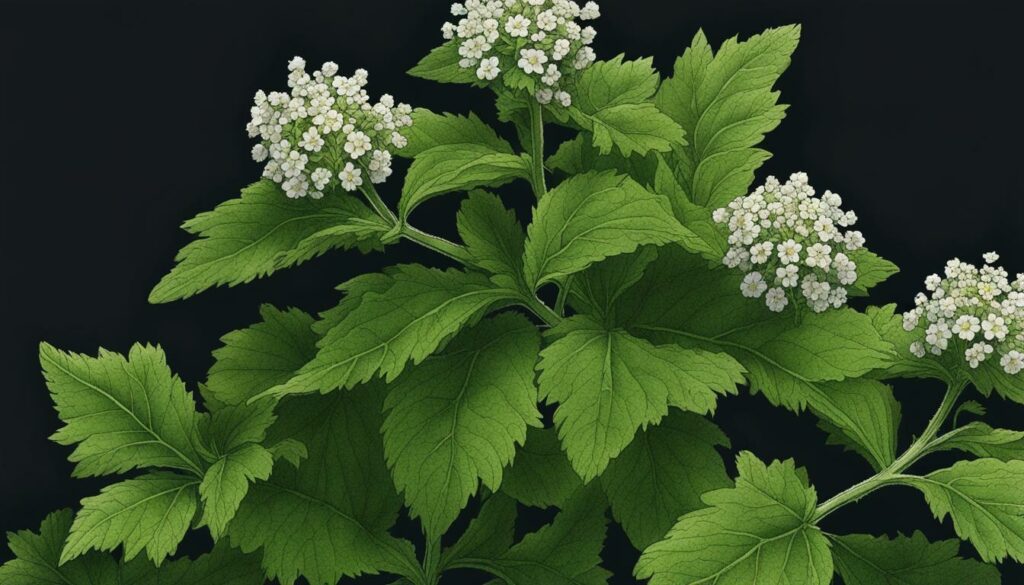
| Benefits of Horehound in Herbal Medicine | Keywords |
|---|---|
| Relieves coughs | cough relief |
| Supports respiratory health | respiratory health |
| Aids digestion | digestion |
| Reduces inflammation | inflammation |
76. Motherwort
Health Benefits of Motherwort
Motherwort is an herb used in herbal remedies, particularly for women’s health. It offers a range of health benefits that can support overall well-being.
One of the key benefits of motherwort is its ability to promote heart health. It has been used traditionally to support cardiovascular function and maintain healthy blood pressure levels.

Motherwort also has calming properties that can help reduce anxiety and promote a sense of relaxation. It is often used as a natural remedy for anxiety and related symptoms.
For women, motherwort can be particularly beneficial for menstrual health. It can help regulate and relieve menstrual cramps, reduce excessive bleeding, and provide support during menopause.
Overall, motherwort is a valuable herb in the realm of herbal remedies, with its positive effects on women’s health, heart health, anxiety, and menstrual health.
77. Mugwort
Mugwort is a versatile herb that has been used for centuries in herbal medicine for its various benefits. It offers a range of uses, including supporting digestion, promoting restful sleep, aiding in menstrual health, and providing stress relief.
Digestion: Mugwort has traditionally been used to support digestive health. It can help stimulate appetite, ease indigestion, and relieve gastrointestinal discomfort.
Sleep: Mugwort is known for its calming properties and can help promote restful sleep. It can aid in relaxation, reduce anxiety, and improve overall sleep quality.
Menstrual Health: Mugwort has been used to support menstrual health, particularly in regulating menstrual cycles and reducing menstrual cramps. It can help alleviate pain and discomfort associated with menstruation.
Stress Relief: Mugwort has been used as a natural stress reliever. It can help calm the mind, reduce stress and anxiety, and promote a sense of relaxation.
Whether you’re looking to improve digestion, enhance sleep quality, support menstrual health, or find stress relief, mugwort is a beneficial herb to consider in your herbal remedy arsenal.

78. Oregon Grape
Oregon grape, also known as Mahonia aquifolium, is an herb that has been used in herbal remedies for centuries. It is native to North America and is known for its vibrant yellow flowers and dark purple berries. Oregon grape contains powerful compounds that offer a range of health benefits.
Health Benefits of Oregon Grape
Oregon grape is highly valued for its therapeutic properties, which can support overall well-being. Here are some of the health benefits associated with this herbal remedy:
- Skin Health: Oregon grape is known for its beneficial effects on the skin. It has anti-inflammatory properties that can help soothe skin conditions such as psoriasis, eczema, and acne. It is also rich in antioxidants, which can protect the skin from damage caused by free radicals.
- Digestive Health: Oregon grape can promote digestive health by supporting the liver and gallbladder. It stimulates the production of bile, which aids in the breakdown and absorption of fats. It can also help alleviate symptoms of indigestion, bloating, and constipation.
- Urinary Health: Oregon grape has diuretic properties, which means it can help increase urine production and promote urinary health. It may be beneficial for conditions such as urinary tract infections and bladder inflammation.
- Anti-Inflammatory: The active compounds in Oregon grape, such as berberine, have anti-inflammatory effects. This can help reduce inflammation throughout the body, providing relief for conditions such as arthritis and inflammatory bowel disease.

With its diverse range of health benefits, Oregon grape is a valuable addition to any herbal remedies collection. Whether you’re looking to improve your skin health, support your digestive system, promote urinary health, or reduce inflammation, Oregon grape offers natural support for your well-being.
79. Pleurisy Root
Uses of Pleurisy Root in Herbal Medicine
Pleurisy root is a powerful herb used in herbal remedies to support respiratory health. It has been traditionally used to alleviate symptoms of respiratory conditions and promote lung function. This herb is known for its expectorant properties, which help to loosen and expel phlegm from the respiratory tract, providing relief from coughs and congestion. Pleurisy root also possesses anti-inflammatory properties, which can help reduce inflammation in the lungs and airways.
In addition to its respiratory benefits, pleurisy root is also valued for its digestive health properties. It is believed to support healthy digestion and can help relieve digestive discomfort and promote overall digestive well-being.

80. Solomon’s Seal
Solomon’s Seal is an herb that has long been recognized for its numerous health benefits and is widely used in herbal remedies. This plant, scientifically known as polygonatum biflorum, has been used for centuries in traditional medicine systems across the world.
One of the key advantages of Solomon’s Seal is its positive impact on joint health. Its natural anti-inflammatory properties make it a popular choice among those seeking relief from joint pain and stiffness. It can help reduce inflammation and promote joint flexibility, making it an excellent herbal remedy for individuals with joint conditions like arthritis.
Furthermore, Solomon’s Seal is beneficial for bone health. It contains natural compounds that support bone density and strength, making it a valuable herb for maintaining good skeletal health. Regular consumption of Solomon’s Seal can help prevent and manage conditions like osteoporosis.
In addition to its joint and bone benefits, Solomon’s Seal also offers advantages for digestive health. It aids digestion and helps soothe gastrointestinal issues such as indigestion and bloating. Its gentle nature makes it suitable for individuals with sensitive stomachs.
Last but not least, Solomon’s Seal can support respiratory health. It can help alleviate respiratory discomfort and promote lung function. People suffering from conditions such as asthma or bronchitis may find relief by incorporating Solomon’s Seal into their herbal remedies.
Overall, Solomon’s Seal is a versatile herb with a wide range of health benefits. Its effectiveness in supporting joint health, bone health, digestive health, and respiratory health makes it a valuable addition to any herbal medicine collection.

| Health Benefits of Solomon’s Seal |
|---|
| Supports joint health |
| Promotes bone health |
| Aids digestion |
| Supports respiratory health |
81. Blue Cohosh
Blue cohosh is an herb commonly used in herbal medicine for women’s health. It has been traditionally used to address various concerns related to menstrual health, labor induction, and uterine health.

Blue cohosh is known for its potential to support menstrual health by regulating the menstrual cycle and relieving menstrual cramps. It is often used by women to alleviate symptoms associated with their monthly cycle.
In addition to menstrual health, blue cohosh is sometimes used to aid in labor induction. It is believed to help stimulate contractions and facilitate the progression of labor.
Furthermore, blue cohosh is valued for its potential benefits for uterine health. It can help tone and strengthen the uterus, promoting overall uterine wellness.
82. Wild Indigo
Wild indigo is an herb used in herbal remedies for its immune-supporting properties. This powerful herb has been used for centuries to enhance the body’s natural defense mechanisms and promote overall wellness.
One of the key health benefits of wild indigo is its ability to support respiratory health. It can help soothe the respiratory system, relieve congestion, and promote healthy lung function. This makes it a valuable addition to herbal formulations for individuals dealing with respiratory issues.
In addition to its respiratory benefits, wild indigo also has anti-inflammatory properties. It can help reduce inflammation in the body, which is beneficial for managing conditions such as arthritis and other inflammatory diseases.
Wild indigo is also known for its antimicrobial properties, making it an effective herb for fighting off infections. It can help strengthen the immune system and protect the body from harmful pathogens.
Adding wild indigo to your herbal regimen can provide immune support and promote respiratory health. Whether you’re dealing with inflammation, infection, or simply want to boost your overall immune function, wild indigo can be a valuable herbal remedy to consider.

83. Wild Lettuce
Uses of Wild Lettuce in Herbal Medicine
Wild lettuce is a popular herb in herbal medicine, valued for its calming and pain-relieving properties. This versatile herb has been used for centuries to provide relief from various ailments.
One of the key uses of wild lettuce is pain relief. It has natural analgesic properties that can help alleviate discomfort caused by conditions such as headaches, migraines, and muscle pain. Whether it’s a tension headache or muscle soreness, wild lettuce can be a valuable herbal remedy to help you find relief.
In addition to pain relief, wild lettuce is also known for its ability to promote restful sleep. If you struggle with insomnia or have difficulty falling asleep, incorporating wild lettuce into your bedtime routine may help. Its calming effects can help relax your mind and body, allowing you to achieve a more peaceful and rejuvenating sleep.
Furthermore, wild lettuce has been used to address symptoms of anxiety. Its calming properties can help soothe an anxious mind and promote a sense of relaxation. By incorporating wild lettuce into your herbal remedies, you may experience a gentle reduction in anxiety levels, enabling you to navigate stressful situations more calmly.
84. Chaga Mushroom
Overview of Chaga Mushroom
Chaga mushroom (Inonotus obliquus) is a medicinal mushroom that grows on birch trees in cold regions. It has been used in traditional medicine for centuries due to its potential health benefits. Chaga mushroom is rich in antioxidants, including polysaccharides and phenolic compounds, which contribute to its medicinal properties. These antioxidants may have anti-inflammatory, immune-boosting, and anticancer effects.
Chaga mushroom is commonly consumed as a tea or used as an ingredient in various herbal remedies. Its earthy flavor and potential health benefits have made it popular among natural health enthusiasts. Some of the key health benefits associated with chaga mushroom include:
- Reducing inflammation: Chaga mushroom contains compounds that may help reduce inflammation in the body, which can contribute to improved overall health and well-being.
- Boosting the immune system: The polysaccharides found in chaga mushroom have been shown to enhance immune system function, potentially helping the body fight off infections and diseases.
- Supporting overall well-being: Chaga mushroom is believed to have adaptogenic properties, which means it may help the body adapt to stress and promote overall balance and well-being.
To enjoy the health benefits of chaga mushroom, you can brew it as a tea or incorporate it into your favorite recipes. Chaga mushroom tea is a popular choice, as it allows you to easily consume the beneficial compounds found in this medicinal mushroom. Simply steep dried chaga mushroom in hot water for about 15 minutes, strain, and enjoy the earthy and comforting flavor of this herbal tea.

85. Reishi Mushroom
Reishi mushroom (Ganoderma lucidum) is a type of fungus that has been used in traditional Chinese medicine for centuries. It is known for its potential health benefits and is often referred to as the “mushroom of immortality.” Reishi mushroom contains various bioactive compounds, including polysaccharides and triterpenes, which contribute to its medicinal properties.
Some potential health benefits of reishi mushroom include:
- Boosting the immune system
- Reducing inflammation
- Promoting relaxation
- Supporting heart health
Reishi mushroom is available in various forms, including dried mushrooms, extracts, and supplements.

| Health Benefits of Reishi Mushroom | Forms |
|---|---|
| Boosting the immune system | Extracts, supplements |
| Reducing inflammation | Dried mushrooms, extracts |
| Promoting relaxation | Extracts, supplements |
| Supporting heart health | Dried mushrooms, supplements |
86. Shiitake Mushroom
Overview of Shiitake Mushroom
Shiitake mushroom (Lentinula edodes) is a popular culinary mushroom known for its rich flavor and potential health benefits. Native to East Asia, shiitake mushrooms have been used for centuries in traditional Chinese medicine due to their immune-boosting and disease-fighting properties. These mushrooms are not only delicious but also packed with vitamins, minerals, and bioactive compounds like polysaccharides and beta-glucans.
One of the key health benefits of shiitake mushroom is its ability to enhance the immune system. The bioactive compounds present in shiitake mushrooms have been shown to stimulate the production of immune cells, helping the body defend against infections and diseases.
In addition to supporting immune health, shiitake mushrooms also offer benefits for heart health. They contain compounds that can help lower cholesterol levels and reduce the risk of heart disease.
Shiitake mushrooms are also known for their positive impact on digestion. They contain dietary fiber and enzymes that support healthy digestion and may alleviate digestive issues like constipation and bloating.
Furthermore, shiitake mushrooms possess anti-inflammatory properties, which can help reduce inflammation in the body. Chronic inflammation is associated with various diseases, including heart disease, cancer, and autoimmune disorders.
There are numerous ways to incorporate shiitake mushrooms into your diet. They can be used in various recipes, such as soups, stir-fries, and sauces. Additionally, shiitake mushroom extract and supplements are available for those who want to enjoy their health benefits in a convenient form.
Discover the delicious flavor and potential health benefits of shiitake mushrooms by exploring some flavorful shiitake mushroom recipes. Shiitake mushrooms can add depth and umami to dishes like mushroom risotto, mushroom pasta, or even grilled shiitake skewers. Get creative in the kitchen and enjoy the taste and benefits of this versatile mushroom.
Enhance your well-being with shiitake mushrooms and unlock their immune-boosting, heart-healthy, and anti-inflammatory properties. Incorporate this culinary delight into your meals and nourish your body with the goodness of shiitake mushrooms.

87. Maitake Mushroom
Maitake mushroom (Grifola frondosa) is a type of edible mushroom that has been used in traditional Japanese and Chinese medicine for centuries. Recognized for its potential health benefits, maitake mushroom is sometimes referred to as the “hen of the woods” due to its unique appearance. This species of mushroom contains various bioactive compounds, including beta-glucans, polysaccharides, and antioxidants. These compounds contribute to its medicinal properties and make it a valuable addition to a healthy diet or as a supplement.
One of the key health benefits of maitake mushroom is its ability to boost the immune system. Research suggests that the beta-glucans in maitake mushroom can enhance immune function, helping the body fight off pathogens and other harmful substances. In addition to immune support, maitake mushroom has also been found to support heart health. Studies have shown that it may help lower cholesterol levels and reduce the risk of cardiovascular diseases.
Managing blood sugar levels is another potential benefit of maitake mushroom. Research has indicated that certain compounds in maitake mushroom may have a positive impact on blood sugar regulation, making it potentially beneficial for individuals with diabetes or those at risk of developing the condition.
Furthermore, maitake mushroom has been associated with promoting overall well-being. Its antioxidant content helps protect the body against oxidative stress and inflammation, which play key roles in various chronic conditions and aging. By reducing inflammation and oxidative stress, maitake mushroom may support overall health and vitality.

Incorporating maitake mushroom into your diet can be as simple as adding it to various dishes. It has a rich and savory flavor that complements many recipes. Alternatively, maitake mushroom extract is available as a supplement for those who prefer a convenient and concentrated form.
88. Turkey Tail Mushroom
| Properties | Benefits |
|---|---|
| Turkey Tail Mushroom (Trametes versicolor), also known as “cloud mushroom” or “yun zhi” in Chinese, is a common mushroom found in forests worldwide. This mushroom gets its name from its striking resemblance to the fan-like tail of a turkey, with beautiful bands of color. Apart from its unique appearance, turkey tail mushroom is renowned for its rich bioactive compounds, including polysaccharides, peptides, and beta-glucans. These compounds contribute to its potential health benefits. |
|
Turkey tail mushroom can be enjoyed in various forms to harness its health benefits. It can be brewed as a tea, added to soups or stews, or consumed as a supplement in the form of extracts or capsules. Incorporating this functional mushroom into your wellness routine may contribute to a stronger immune system, improved gut health, reduced inflammation, and enhanced antioxidant protection.

89. Lemon Balm
Overview of Lemon Balm
Lemon balm (Melissa officinalis) is a fragrant herb that belongs to the mint family. It has a lemony scent and is known for its calming and soothing properties. Lemon balm has been used in traditional medicine for centuries and is often consumed as a tea. It contains various compounds, including terpenes and polyphenols, that contribute to its potential health benefits. Some of the potential health benefits of lemon balm include reducing anxiety, improving sleep quality, easing digestive discomfort, and promoting relaxation. Lemon balm can be enjoyed as a tea, added to culinary dishes, or taken in supplement form.

90. Black Elderberry
Black elderberry (Sambucus nigra) is a dark purple fruit that has been used for centuries in traditional medicine. This powerful fruit is packed with vitamins, minerals, and antioxidants, making it a valuable addition to your health regimen. One popular way to consume black elderberry is through elderberry syrup, a natural remedy known for its potential health benefits.
Black elderberry is believed to have numerous health benefits. It is known for its ability to boost the immune system, helping to defend against common illnesses such as colds and flu. Research suggests that black elderberry may help reduce the severity and duration of cold and flu symptoms, allowing you to recover more quickly and get back to feeling your best.
This versatile fruit also offers support for heart health. Black elderberry contains anthocyanins, a type of antioxidant that protects against oxidative stress and inflammation, both of which contribute to heart disease. Including black elderberry in your diet may help support healthy cardiovascular function.
Additionally, black elderberry is known for promoting healthy skin. The antioxidants found in black elderberry can help combat the damaging effects of free radicals on the skin, reducing the signs of aging and promoting a youthful appearance. You can enjoy the benefits of black elderberry by incorporating it into your skincare routine or consuming it in supplement form.
Whether you prefer to take it in elderberry syrup or as a supplement, black elderberry is a natural powerhouse with potential health benefits for your immune system, heart, and skin. Consider adding black elderberry to your daily routine to support your overall well-being.
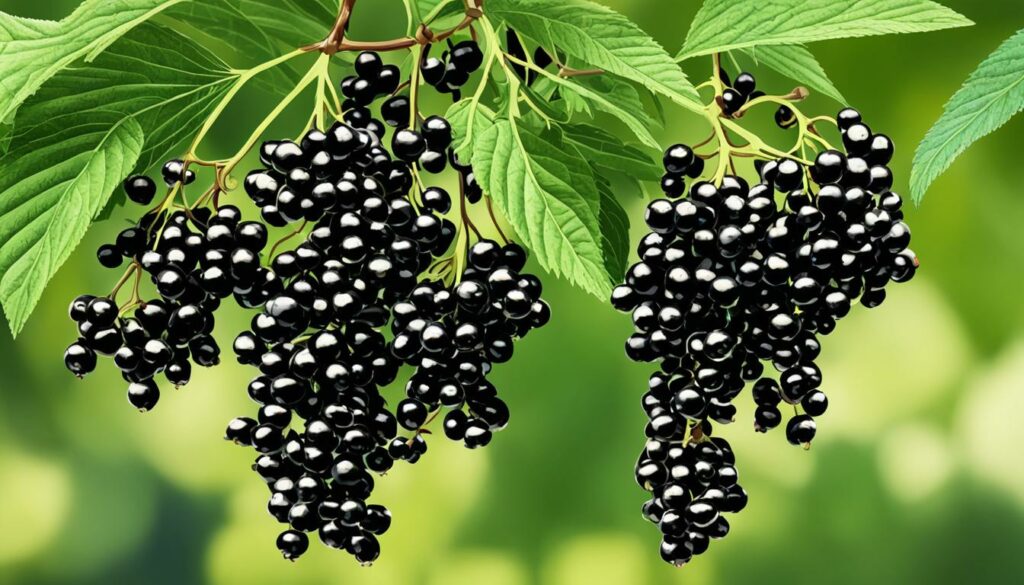
91. Fenugreek
Overview of Fenugreek
Fenugreek (Trigonella foenum-graecum) is an herb commonly used in cooking and traditional medicine. With its origins in the Mediterranean region, fenugreek has a long history of medicinal use. The seeds of fenugreek are a popular ingredient in Indian cuisine and are also utilized as a supplement.
Fenugreek contains a range of beneficial compounds, including saponins and flavonoids, which contribute to its potential health benefits. These compounds have been studied for their effects on various aspects of well-being.
Some of the potential health benefits of fenugreek include:
- Improving blood sugar control
- Reducing inflammation
- Supporting digestive health
- Enhancing milk production in breastfeeding women
Fenugreek can be consumed in various forms, allowing for flexibility in its usage. Whole fenugreek seeds, powder, capsules, or its incorporation in culinary dishes are all popular methods of consumption.

92. Marjoram
Overview of Marjoram
Marjoram (Origanum majorana) is an aromatic herb commonly used in culinary dishes. It is closely related to oregano and has a similar flavor and aroma. Marjoram has also been used in traditional medicine for its potential health benefits. It contains compounds like terpenes and flavonoids that contribute to its medicinal properties. Some potential health benefits of marjoram include reducing inflammation, promoting digestion, relieving muscle tension, supporting heart health, and improving sleep quality. Marjoram can be enjoyed fresh or dried as a culinary herb, used in herbal preparations, or taken as an essential oil.

Health Benefits of Marjoram
| Health Benefit | Description |
|---|---|
| Reducing inflammation | Marjoram contains compounds that have anti-inflammatory properties, which may help reduce inflammation in the body. |
| Promoting digestion | The essential oils in marjoram can help stimulate digestion and relieve digestive issues such as indigestion and bloating. |
| Relieving muscle tension | Marjoram has a relaxing effect on the muscles and may help alleviate muscle tension and soreness. |
| Supporting heart health | Some studies suggest that marjoram may have cardioprotective properties and can help support heart health. |
| Improving sleep quality | The soothing aroma of marjoram essential oil may help promote relaxation and improve the quality of sleep. |
93. Patchouli
Overview of Patchouli
Patchouli (Pogostemon cablin) is a fragrant herb commonly used in perfumes and aromatherapy. It has a rich and earthy scent that is often associated with relaxation and grounding.
Patchouli has been used in traditional medicine for its potential health benefits. It contains compounds like patchoulol and pogostone that contribute to its medicinal properties.
Some potential health benefits of patchouli include:
- Relieving stress and anxiety
- Promoting sleep
- Reducing inflammation
- Supporting healthy skin
Patchouli can be used in aromatherapy, added to skincare products, or taken as an essential oil.

94. Tarragon
Overview of Tarragon
Tarragon (Artemisia dracunculus) is an herb commonly used in culinary dishes and traditional medicine. It has a distinct flavor that is often described as bittersweet and anise-like. Tarragon contains compounds like estragole and eugenol that contribute to its potential health benefits. Some potential health benefits of tarragon include improving digestion, reducing inflammation, relieving pain, and supporting heart health. Tarragon can be used in culinary dishes, brewed as a tea, or taken in supplement form.

| Health Benefits of Tarragon |
|---|
| Improves digestion |
| Reduces inflammation |
| Relieves pain |
| Supports heart health |
95. Vetiver
Vetiver (Vetiveria zizanioides) is a type of grass that is known for its aromatic roots. It has a deep and earthy fragrance and has been used in traditional medicine for its potential health benefits. Vetiver contains compounds like vetiverol and vetiverone that contribute to its medicinal properties. Some potential health benefits of vetiver include reducing anxiety and stress, promoting relaxation, improving sleep quality, and supporting healthy skin. Vetiver can be used in aromatherapy, added to skincare products, or taken as an essential oil.

96. Wintergreen
Overview of Wintergreen
Wintergreen (Gaultheria procumbens) is a small evergreen shrub that is known for its aromatic leaves. It has a strong and minty scent and has been used in traditional medicine for its potential health benefits. Wintergreen contains a compound called methyl salicylate, which contributes to its medicinal properties. Some potential health benefits of wintergreen include:
- Relieving pain and inflammation
- Improving digestion
- Soothing headaches
- Promoting relaxation
Wintergreen can be used in various forms such as:
- Topically as an oil or ointment
- Brewed as a tea
- Taken in supplement form
Experience the natural benefits of wintergreen to support your well-being.

97. Lemon Myrtle
Overview of Lemon Myrtle
Lemon myrtle, scientifically known as Backhousia citriodora, is a flowering plant native to Australia. With its strong and citrusy aroma, reminiscent of lemon, lemon myrtle is widely used in culinary dishes and beverages to add a refreshing twist. However, its benefits extend beyond the kitchen. Lemon myrtle has been treasured in traditional medicine for its numerous potential health benefits.
This remarkable plant contains natural compounds such as citral and linalool, which contribute to its distinctive fragrance and medicinal properties. These compounds offer a range of potential health benefits that can enhance your well-being.
One of the key advantages of lemon myrtle is its ability to support digestion. Its gentle yet effective properties can aid in soothing digestive discomfort and promoting healthy digestion.
Furthermore, lemon myrtle is renowned for its immune-boosting properties. Its natural compounds can strengthen your immune system, helping to defend against common illnesses and promoting overall wellness.
In addition, lemon myrtle exhibits anti-inflammatory properties, which can be beneficial for managing inflammation-related conditions. By reducing inflammation, it may help alleviate symptoms and improve overall comfort.
Moreover, lemon myrtle is known for its potential to promote healthy skin. Its natural properties can support skin health, leaving your complexion looking radiant and rejuvenated.
There are various ways to incorporate lemon myrtle into your lifestyle. You can use it in culinary recipes to infuse a zesty lemon flavor into your dishes. Additionally, lemon myrtle leaves can be brewed as a fragrant and refreshing tea. If you prefer a more concentrated form, lemon myrtle essential oil offers a convenient way to reap its benefits.
Experience the natural wonders of lemon myrtle and discover how this versatile plant can enhance your overall health and well-being.

98. Lemon Thyme
Lemon thyme (Thymus citriodorus) is an herb with a strong lemon aroma and a hint of thyme flavor. It is often used in culinary dishes for its unique taste and fragrance. Lemon thyme has also been used in traditional medicine for its potential health benefits. It contains compounds like thymol and carvacrol that contribute to its medicinal properties. Some potential health benefits of lemon thyme include supporting digestion, boosting the immune system, reducing inflammation, and promoting healthy skin. Lemon thyme can be used in culinary recipes, brewed as a tea, or taken as an essential oil.
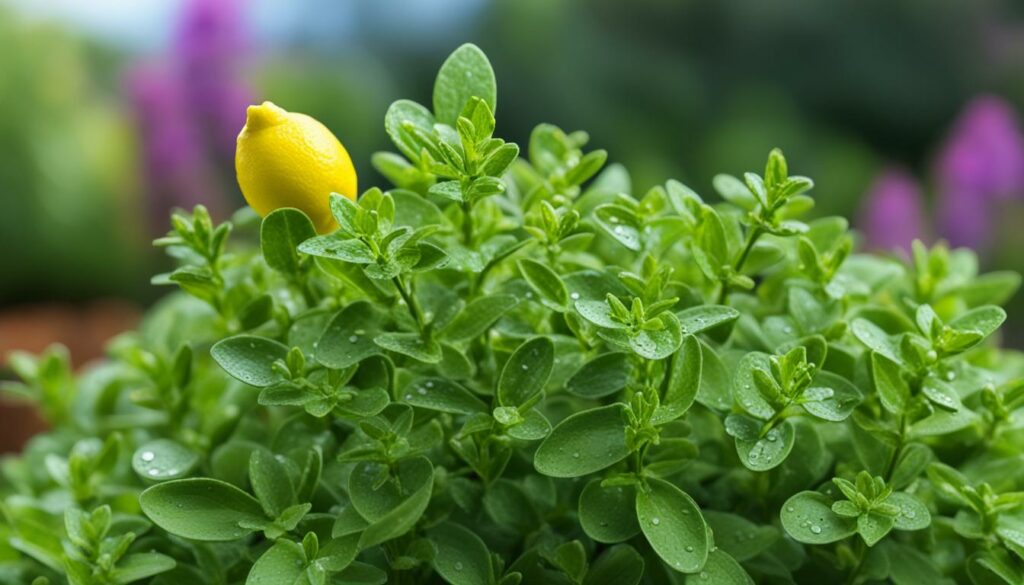
| Health Benefits | Uses |
|---|---|
| Supports digestion | Can be used in culinary recipes |
| Boosts immune system | Can be brewed as a tea |
| Reduces inflammation | Can be taken as an essential oil |
| Promotes healthy skin |
99. Bergamot
Overview of Bergamot
Bergamot (Citrus bergamia) is a citrus fruit that is known for its distinctive aroma and flavor. It is primarily grown in Italy and is often used in perfumes, teas, and culinary recipes. Bergamot has also been used in traditional medicine for its potential health benefits. It contains compounds like limonene and linalool that contribute to its medicinal properties. Some potential health benefits of bergamot include reducing anxiety and stress, promoting relaxation, supporting healthy skin, and aiding digestion. Bergamot can be used in aromatherapy, brewed as a tea, or taken as an essential oil.

- Add a few drops of bergamot essential oil to a diffuser to create a calming and uplifting atmosphere in your home or workspace.
- Brew a cup of bergamot tea by steeping dried bergamot peel in hot water for 5-10 minutes. Enjoy its soothing aroma and potential health benefits.
- Try using bergamot essential oil in your skincare routine. Add a few drops to your favorite carrier oil or lotion to promote healthy skin and reduce blemishes.
- Use bergamot-infused products, such as soaps, lotions, or candles, to enjoy its refreshing scent and potential therapeutic effects.
Whether you incorporate bergamot into your aromatherapy practice, enjoy a cup of bergamot tea, or indulge in bergamot-infused products, the aromatic and medicinal properties of this citrus fruit can provide a pleasant and beneficial addition to your wellness routine.
100. Lemon Eucalyptus
Overview of Lemon Eucalyptus
Lemon eucalyptus (Eucalyptus citriodora) is a type of eucalyptus tree known for its refreshing lemony scent and natural insect-repellent properties. This versatile plant has been used in traditional medicine for its potential health benefits, making it a popular choice among herbal enthusiasts.
Lemon eucalyptus contains compounds like citronellal and citronellol that contribute to its medicinal properties. These compounds are known for their ability to repel insects, making lemon eucalyptus a natural and effective alternative to chemical insect repellents.
Aside from its insect-repellent properties, lemon eucalyptus also offers other potential health benefits. It may help reduce inflammation, promote relaxation, and support respiratory health. Additionally, the refreshing aroma of lemon eucalyptus can uplift your mood and enhance your overall well-being.
You can incorporate lemon eucalyptus into your daily routine in various forms. Topically, you can use lemon eucalyptus essential oil to create homemade insect repellents or add a few drops to carrier oils for a soothing massage. Alternatively, you can find lemon eucalyptus supplements or products containing this beneficial plant extract.
Experience the natural power of lemon eucalyptus and explore its health-promoting properties. Whether you’re looking for an effective insect repellent or seeking to enhance your well-being, lemon eucalyptus may be just what you need.

101. Sweet Basil
Overview of Sweet Basil
Sweet basil (Ocimum basilicum) is an herb commonly used in culinary dishes around the world. It has a sweet and peppery flavor and is known for its versatility in various cuisines. Sweet basil has also been used in traditional medicine for its potential health benefits. It contains compounds like eugenol and linalool that contribute to its medicinal properties.
Some potential health benefits of sweet basil include:
- Reducing inflammation
- Promoting digestion
- Relieving stress
- Supporting healthy skin
Sweet basil can be used in culinary recipes, brewed as a tea, or taken as an essential oil.

Conclusion
Medicinal herbs offer a natural and holistic approach to health and wellness. Whether you’re exploring mushrooms like chaga, reishi, and shiitake, or herbs like lemon balm, black elderberry, and fenugreek, the world of medicinal herbs is diverse and vast. Each herb holds its own unique set of potential health benefits, such as boosting your immune system, reducing inflammation, improving digestion, or promoting relaxation.
However, it’s important to remember that incorporating medicinal herbs into your routine should be done with caution. Before starting any herbal remedies, it’s crucial to consult with a healthcare professional, particularly if you have pre-existing health conditions or are taking medications. They can provide guidance on the appropriate usage and potential interactions.
Embrace the power of nature and explore the world of medicinal herbs to enhance your overall well-being. From ancient traditional medicine to modern herbal treatments, these natural remedies have stood the test of time. Whether you’re looking for herbal supplements or trying your hand at herbal medicine, the wide range of types of medicinal herbs offers something for everyone.
FAQ
What are medicinal herbs?
Medicinal herbs, also known as medicinal plants, are plants that have been used for centuries for their healing properties. These plants contain various parts like leaves, bark, stems, roots, seeds, and flowers, which are utilized to create herbal remedies.
What are herbal remedies?
Herbal remedies are natural remedies made from medicinal herbs. They are used in traditional medicine to treat various health conditions and promote overall well-being.
What are the health benefits of herbs?
Different types of medicinal herbs offer a wide range of potential health benefits. They can boost the immune system, reduce inflammation, improve digestion, promote relaxation, support heart health, and much more. However, it’s important to consult with a healthcare professional before incorporating medicinal herbs into your routine, especially if you have any pre-existing health conditions or are taking medications.
Are herbal remedies considered cures for all ailments?
No, herbal remedies are not considered cures for all ailments. While they can offer certain health benefits and have been used in traditional medicine, they are not a substitute for professional medical advice or treatment. It’s important to rely on evidence-based medicine and consult with a healthcare professional for proper diagnosis and treatment of any health condition.
Are herbal supplements regulated by the FDA?
The safety and efficacy of herbal supplements are not regulated by the Food and Drug Administration (FDA) in the same way as prescription drugs. It’s important to choose reputable brands and consult with a healthcare professional before taking any herbal supplements to ensure their quality and safety.
Are there any precautions or side effects of herbal remedies?
While herbal remedies are generally considered safe, they can still have side effects or interact with certain medications. It’s important to consult with a healthcare professional before using herbal remedies, especially if you have any pre-existing health conditions, are pregnant or nursing, or are taking medications.
How should I incorporate medicinal herbs into my routine?
The methods of incorporating medicinal herbs into your routine can vary depending on the herb and the desired health benefits. Some common ways include consuming herbal tea, adding herbs to culinary dishes, using herbal preparations such as tinctures or extracts, or taking herbal supplements. It’s important to follow the recommended dosage and instructions provided by the manufacturer or healthcare professional.
Can I grow my own medicinal herbs?
Yes, many medicinal herbs can be grown in your own garden or even in pots indoors. This allows you to have a fresh supply of herbs for culinary and medicinal purposes. Just make sure to research the specific growing requirements of each herb and ensure they are grown in a suitable environment.
Where can I find medicinal herbs and herbal remedies?
Medicinal herbs and herbal remedies can be found in various forms, including health food stores, specialty herb shops, online retailers, and even some supermarkets. It’s important to choose reputable sources and brands to ensure the quality and authenticity of the herbs and remedies.
Are medicinal herbs a replacement for conventional medical treatment?
Medicinal herbs are not meant to replace conventional medical treatment. They can be used as complementary approaches to promote overall health and well-being, but it’s important to seek appropriate medical advice and treatment for any health conditions from qualified healthcare professionals.

